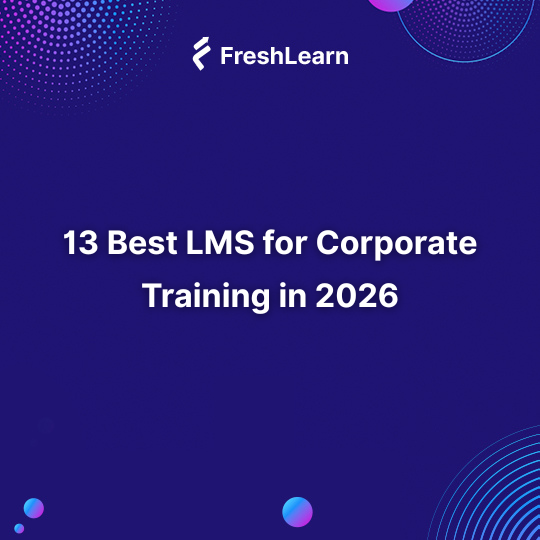
13 Best LMS for Corporate Training in 2026
When you start looking at the best LMS for corporate training, the differences hit you fast. Some give you all the dashboards, compliance reports, and analytics you could ask for, but they can feel heavy, like you need a manual just to get started.
Others are lean and flexible, letting you launch courses and get learners engaged almost immediately, but sometimes at the cost of advanced features.
If you’re trying to figure out which platform actually works for your team, it helps to think about what matters most: scaling, keeping learners engaged, and getting measurable results without unnecessary complexity.
That perspective is exactly what shaped this guide.
Here, I’ve compared 13 leading corporate training platforms to see where each shines, where it might slow you down, and why FreshLearn stands out for businesses looking to grow training programs that bring real outcomes.
Buyer personas and top criteria
When it comes to choosing an LMS, there isn’t a one-size-fits-all checklist. An L&D leader, a product training manager, and an IT head will each zero in on different priorities. Here’s a look at how those perspectives play out.
We asked Jean-Louis Bénard, CEO, Sociabble, and this is what he said:
"One of the key benefits of an LMS for corporate training is the ability to ensure consistent employee onboarding; it turns day-one chaos into a repeatable system with clear milestones and leadership dashboards."
At a glance — TL;DR (short, buyer-help)
13 best LMS for corporate training in 2026
1. FreshLearn
User rating: 4.7/5
Best for: FreshLearn is ideal for companies that want to cut down the time, cost, and effort of managing corporate training. It gives you a ready-to-use platform where you can create courses, track employee performance, and scale learning programs with ease.
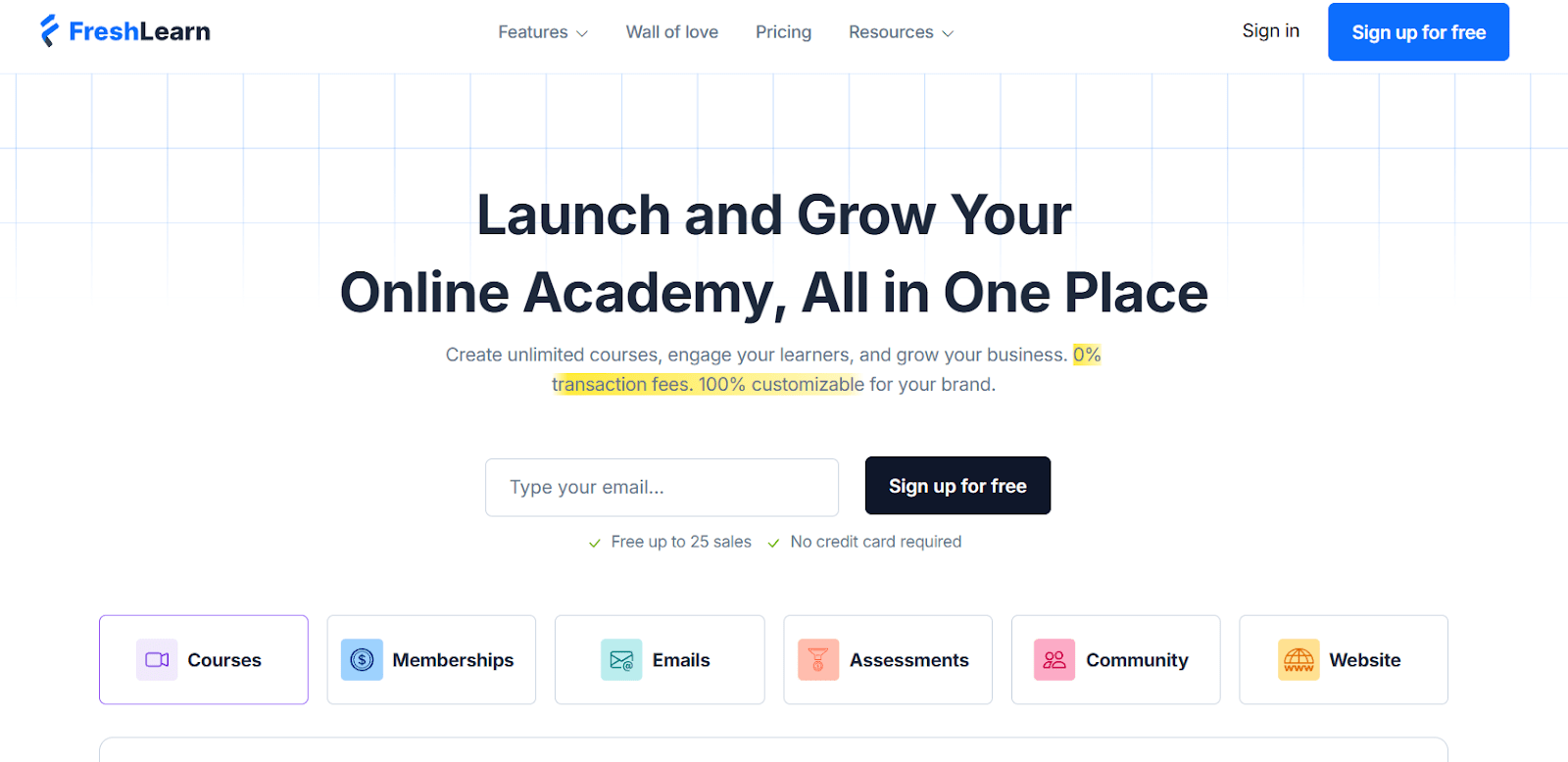
FreshLearn is an intuitive LMS that makes corporate training simple, effective, and scalable. It allows businesses to create and deliver online courses, live workshops, and digital resources without the need for technical expertise.
With its clean design and user-friendly tools, HR teams and managers can quickly roll out training programs, track employee progress, and keep teams engaged. On average, companies set up their training in just 2.3 days, and the platform drives a strong 94% employee adoption rate, making implementation both fast and impactful.
For companies looking for a corporate training platform that balances simplicity with powerful features, FreshLearn offers an all-in-one solution, helping businesses save time, scale learning, and improve productivity.
FreshLearn is ideal for businesses that want an all-in-one platform for corporate training. With us, you can:
- Onboard new hires quickly: Build interactive programs that cover company culture, policies, procedures, and product knowledge. Add gamification and quizzes to make the experience more engaging.
- Deliver product training with ease: Keep employees updated on new products, features, and releases. Sales and customer support teams can access the latest information anytime, ensuring they stay confident and informed.
- Simplify compliance training: Roll out mandatory sessions on topics like workplace safety, data privacy, or anti-harassment. Use our drip content to unlock based on days, completion action, and set dates. This helps you confirm that every employee completes the required training.
Besides this, you can also create and deliver partner training, sales enablement, and leadership development programs, equipping external stakeholders with the right tools and strategies.
FreshLearn’s impact shows up best in real business outcomes. As one of our clients put it:
Top features
- Course builder: Drag-and-drop course editor to create structured training modules with multimedia support.
- Live workshops: Integrated live session hosting for onboarding, compliance, or leadership programs.
- Digital downloads: Option to offer downloadable digital products such as manuals, templates, or reports for offline use.
- Assessment and quizzes: Built-in tools to measure knowledge retention and track performance.
- Certificates: Automated, branded certificates for compliance and skill recognition.
- Analytics dashboard: Real-time reporting on learner progress, completion rates, and engagement.
- Custom branding: White-labeling with company logo, colors, and custom domains.
- Mobile-friendly access: A responsive platform for learning on desktops, tablets, and smartphones (compatible with both Android and iOS devices).
- Community and engagement tools: Peer-learning spaces and access-based group discussions for collaborative training.
- AI agents: FreshLearn includes a suite of AI-powered tools designed to speed up training content creation and reduce manual effort:
- AI course outline generator: Creates structured course outlines instantly based on a given topic.
- AI course idea validator: Analyzes and validates whether a course idea has market demand.
- AI quiz generator: Generates quizzes automatically from course content to test learner knowledge.
- AI blog generator (Coming soon): Drafts training-related blogs to support content marketing and learner engagement.
- AI video caption file generator (Coming soon): Produces accurate captions and transcripts for training videos.
- AI course content generator (Coming soon): Builds full course content drafts using AI for faster program creation.
Advantages of FreshLearn
- User-friendly design: Even beginners can create professional courses with FreshLearn’s intuitive tools.
- Versatile features: From live workshops to e-commerce integrations, it caters to a variety of needs.
- Affordable plans: Accessible pricing makes it ideal for creators at all levels.
- Customization options: Fully tailor your course website to reflect your brand.
- Mobile learning: Engage learners on the go with dedicated mobile apps.
- AI-powered efficiency: Save time with AI tools that streamline content creation and workflows
Limitations to consider
- Limited third-party integrations: FreshLearn offers fewer integrations than some competitors, which could be a drawback for users relying on specific tools.
- Basic marketing features: While functional, its email marketing tools lack the advanced automation features offered by some alternatives.
Pricing plans
For individual creators:
- Pro plan: $49/month or $37/month (when billed annually), $29/month (when billed biennially) - Includes features like custom domains, assessments, and the AI website builder.
- No-brainer plan: $79/month or $59/month (when billed annually), $46/month (when billed biennially) - Adds gamification, a question bank, and an affiliate program.
- No-brainer+ plan: $149/month or $119/month (when billed annually), $89/month (when billed biennially) - Includes API access, priority support via call, email, and live chat, and a dedicated customer success manager.
For companies:
Enterprise plan: $249/month, $169/month (when billed annually) $139/month (when billed biennially). The enterprise plan will have all the features from the brainer+ plan and includes all the important features you will need for your corporate training, including:
- Partner organization groups
- Sandbox instance
- Auto language translation
- Custom integration, reports, and more.
Integrations
- Zapier-powered ecosystem: FreshLearn connects with Zapier to integrate seamlessly with hundreds of popular tools, such as Mailchimp, Shopify, Google Sheets, Razorpay, WooCommerce, MailerLite, monday.com, Flodesk, and more.
- API access for custom workflows: You can leverage FreshLearn’s API to build tailored integrations. For example, auto-enrolling users from Google Forms, syncing learner progress to Google Sheets, or triggering Slack notifications upon course milestones.
- Niche integrations: Through platforms like StackGo, FreshLearn supports integrations such as IdentityCheck for secure KYC (ID verification) during onboarding.
- Payment and marketing tools: Direct support for PayPal, Stripe, Razorpay, Mailchimp, and others for payments and communications.
- HubSpot integration: Marketing teams can also embed FreshLearn content into their HubSpot CMS for customizable styling and a friendly layout.
Security and compliance


Final verdict: FreshLearn is an all-in-one corporate training platform that combines ease of use with powerful features. With its intuitive interface, AI-powered tools, seamless integrations, and rapid setup, it enables organizations to roll out training programs quickly and scale learning with minimal effort.
2. Moodle
User rating: 4.1/5
Best for: Moodle is best for universities, schools, and small organizations that need a flexible, open-source learning platform. It works well when there are in-house technical teams to manage setup, customization, and ongoing maintenance.
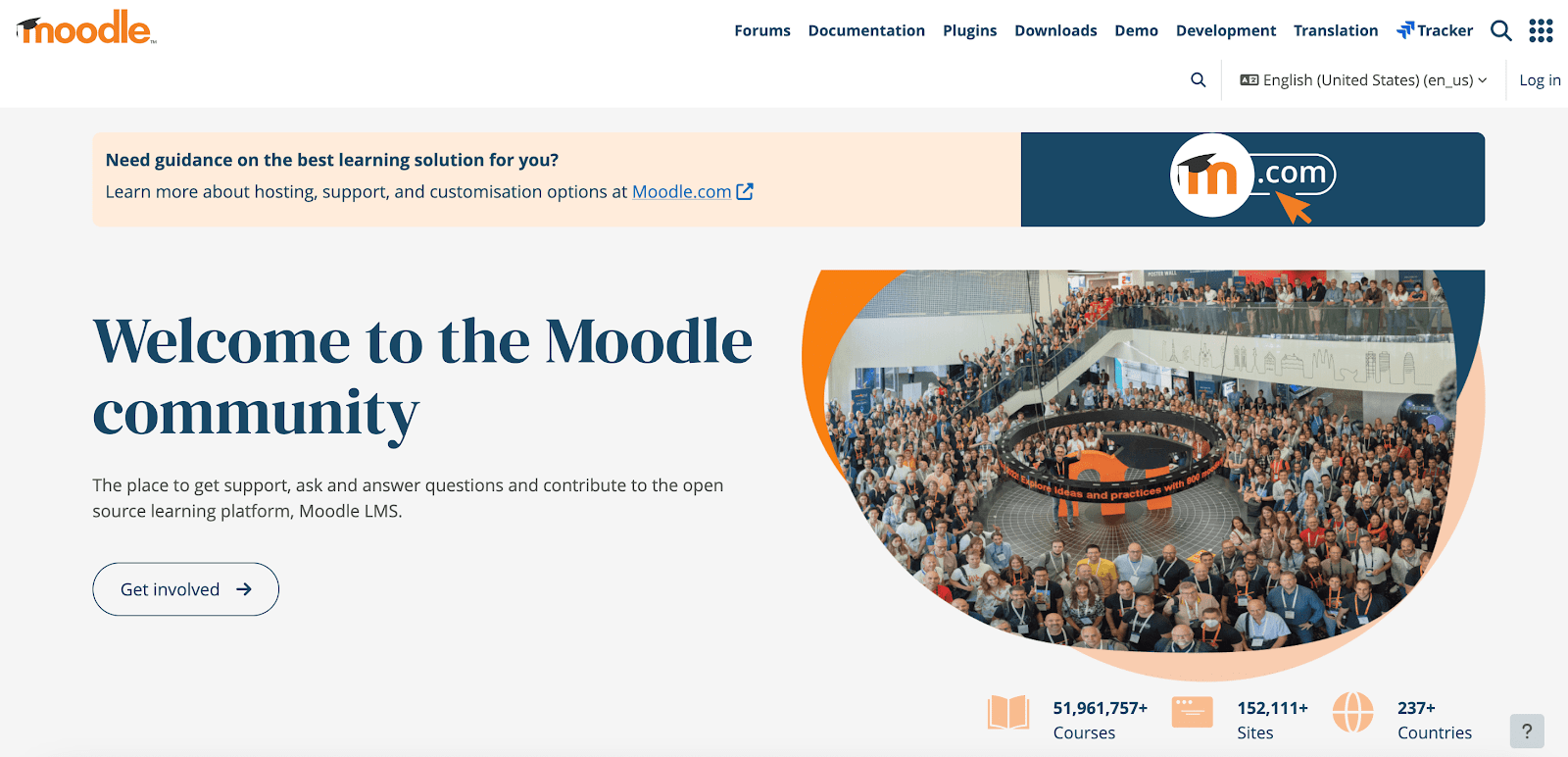
Another widely adopted enterprise learning management system is Moodle. As a free and open-source platform, Moodle gives organizations control over how they design, deliver, and manage training.
It supports custom course structures, role-based access, and tracking, making it suitable for companies with detailed compliance or reporting requirements. With its large plugin ecosystem, businesses can extend Moodle to cover certifications, gamification, analytics, or even niche integrations.
Top features
- Open-source framework: Organizations can access, modify, and extend the platform’s source code to fit specific training requirements.
- Course management tools: Trainers can create structured learning paths, upload resources, set activities, and organize content by modules or topics.
- Assessment and quizzes: Built-in tools allow the creation of quizzes, assignments, and assessments with multiple question types and automated grading.
- Tracking and reporting: Detailed reports show learner progress, course reports, and sidewide reports, useful for compliance and performance monitoring.
- Mobile accessibility: Dedicated mobile apps help learners to access courses, complete activities, and track progress on the go.
- Multilingual support: Moodle includes built-in features that allow learners and trainers to use the platform in multiple languages. Administrators can install and manage language packs, enabling the interface to display in different languages.
Advantages of Moodle
- Cost-effective: Moodle is free to download and use, eliminating licensing fees and making it a budget-friendly choice for small businesses.
- Highly customizable: Access to source code and an extensive plugin library allows businesses to tailor Moodle to their unique branding and training needs.
- Community support: A strong global community offers abundant resources, forums, messaging, and wikis to assist users in troubleshooting and optimization.
Limitations to consider
- Complex setup: Moodle’s initial setup and configuration can be challenging, requiring technical expertise that might not be available to all businesses.
- Maintenance demands: Self-hosting Moodle requires regular updates, security management, and maintenance, which can be resource-intensive.
- User interface: Some users find Moodle’s interface less intuitive or modern compared to other LMS platforms, potentially impacting adoption rates.
Pricing plans
Free version: Moodle is open-source and free to use, making it accessible for small businesses. However, it's important to consider the costs for hosting, customization, and maintenance.
MoodleCloud: For businesses preferring a cloud-hosted solution, MoodleCloud offers different pricing plans starting at $150 per year for up to 50 users. It gives you access to several features, including,
- Personalized site name
- Unlimited courses and activities
- Integration with Google Drive and Dropbox for additional storage.
Want to compare Moodle with other solutions? Take a look at our guide to the top 7 Moodle alternatives.
Integrations
- HRIS Integration: Moodle Workplace can connect with HRIS systems to centralize employee data, track onboarding progress, and generate analytics. These integrations typically use Moodle’s APIs and can be configured to meet an organization’s specific requirements.
- Single Sign-On (SSO): Moodle supports single sign-on (SSO) through standards such as SAML and OAuth, allowing organizations to connect the LMS with existing identity providers like Azure AD or Okta.
Security and compliance
- Moodle US has achieved LMS security SOC 2 Type II certification, providing independent verification of its security controls for data management and operations. The platform follows recognized security frameworks, including OWASP, CWE, and CIS, to maintain secure code and deployment practices.
- Moodle offers tools to help administrators meet GDPR requirements, including policy plugins and data privacy plugins.
Final verdict: Moodle is a flexible, open-source LMS that supports customizable course delivery, reporting, and integrations, making it suitable for organizations with technical resources.
3. Google Classroom
User rating: 4.5/5
Best for: Google Classroom is best for schools and educators who need a simple, centralized platform to manage classes, assignments, and communication. It allows teachers to distribute materials, track student progress, and provide feedback.
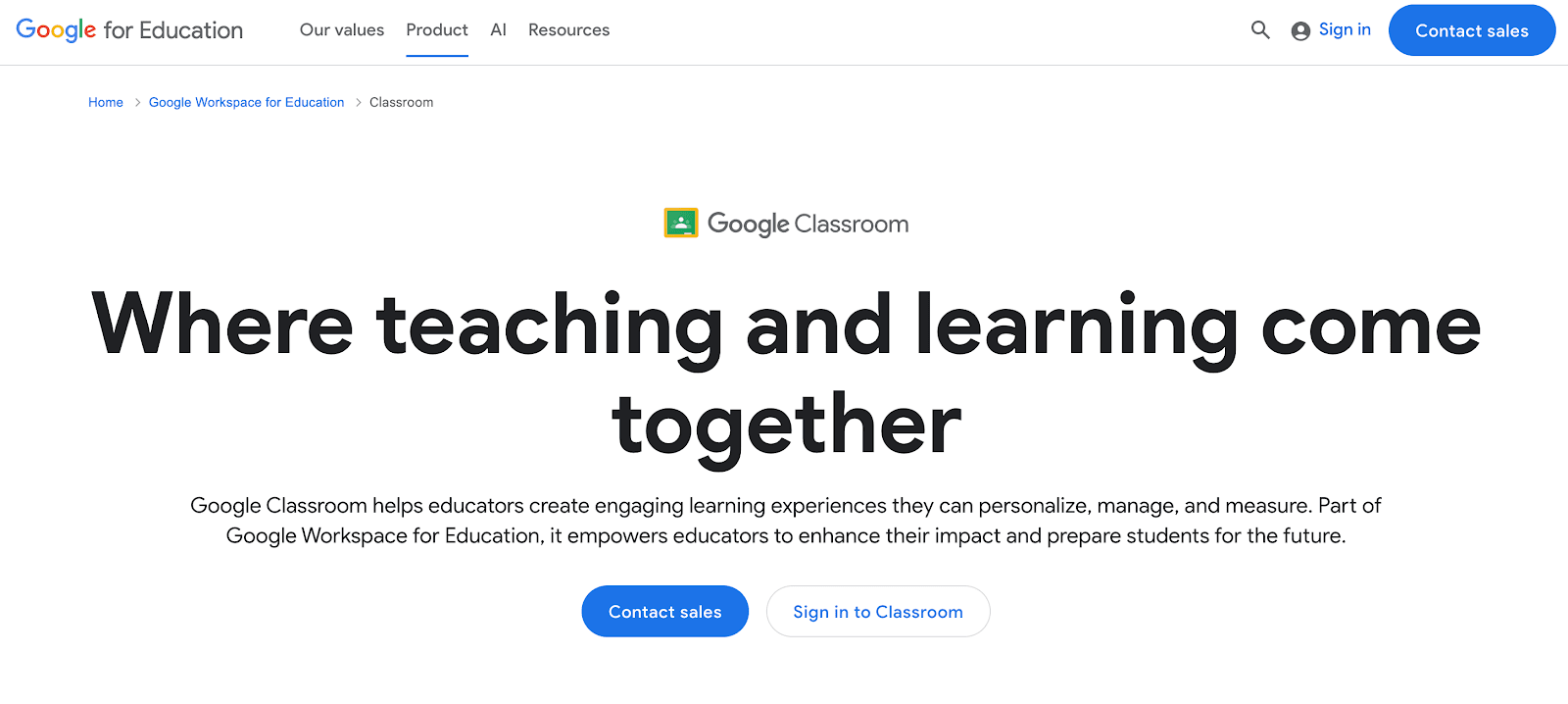
Google Classroom is a web-based platform, part of the Google Workspace suite, designed primarily for educational purposes. It streamlines the process of creating, distributing, and grading assignments while promoting a paperless workflow.
The platform’s integration with other Google services like Docs, Drive, and Meet improves its functionality, making it an effective tool for managing various learning and training activities.
Google Classroom is a best fit for small businesses that:
- Need a simple LMS: Best suited for those looking for a straightforward platform without advanced customization.
- Leverage Google Workspace: Ideal for businesses already using Google’s ecosystem, enabling seamless integration.
- Offer basic training programs: Perfect for running onboarding sessions, basic training, or educational workshops.
Want to explore other LMS options for small businesses? Check out our 8 Best LMS Platforms for Small Businesses.
Top features
- Assignments and grading: Create and distribute assignments using Google Drive, Docs, or YouTube videos. Teachers can grade work, provide feedback, and track student progress easily.
- Personalized learning: Assign interactive questions, set accessibility options, and support individualized learning paths tailored to each student.
- Real-time collaboration: Enable teamwork using Google Docs, Sheets, and Slides.
- Communication tools: Engage learners via announcements, emails, and Google Meet.
- Resource sharing: Organization Tools: Use automated calendars, to-do lists, and class streams to manage assignments, announcements, and discussions in one place.
- Mobile-friendly: Manage and access courses through dedicated mobile apps which has functionalities including announcements and grading.
Advantages of Google Classroom
- Ease of use: The user-friendly interface ensures quick adoption by instructors and learners alike.
- Cost-effective: Being a free platform, it’s perfect for small businesses looking for an affordable learning management solution.
- Seamless integration: Works seamlessly with other Google Workspace tools to enhance workflow.
- Accessibility: As a web-based tool, you can access it from any device with an internet connection, supporting remote learning.
Limitations to consider
- Limited customization: Minimal branding and personalization options may not suit businesses seeking a tailored platform.
- Basic analytics: Lacks advanced reporting capabilities, which can make tracking progress less comprehensive.
- Third-party compatibility: Limited integration with non-Google tools restricts additional functionality.
- Scalability challenges: May not meet the needs of larger organizations or complex training requirements.
Pricing plans
Google Classroom is free for anyone with a Google account, making it a budget-friendly option.
Paid plans are available in Google Workspace for Education, which offer schools or institutions that want additional features (like advanced security, analytics, and administrative controls).
- Education plus: $5 per user per year (or equivalent in local currency)
- Teaching and learning upgrade: $48 per user per year (or equivalent in local currency)
- Flexible plans: $4.80 per user per month (or equivalent in local currency).
Effective October 2025, this pricing will have a revision.
Integrations
- HRIS integration: Google Classroom supports integration with Student Information Systems (SIS) via the OneRoster API. This allows for importing student rosters and exporting grades, facilitating easy data management.
- Single Sign-On (SSO): Google Classroom add-ons must utilize Google Single Sign-On (SSO) for user authentication.
Security and compliance
- Google Cloud undergoes regular third-party audits to certify individual products, including Google Workspace, against SOC 2 standards, ensuring strong security and data protection measures.
- Google Workspace for Education supports compliance with the EU General Data Protection Regulation (GDPR), providing tools and documentation to help educational institutions meet data protection requirements.
Final verdict: Google Classroom is a simple, reliable platform for managing assignments and tracking progress, but its limited advanced features and dependence on Google’s ecosystem can be restrictive for some institutions.
4. TalentLMS
User rating: 4.6/5
Best for: TalentLMS is best suited for small to medium-sized businesses and training teams that need a flexible platform to deliver online courses and training programs. It allows organizations to structure learning paths, track learner progress, and manage assessments efficiently.
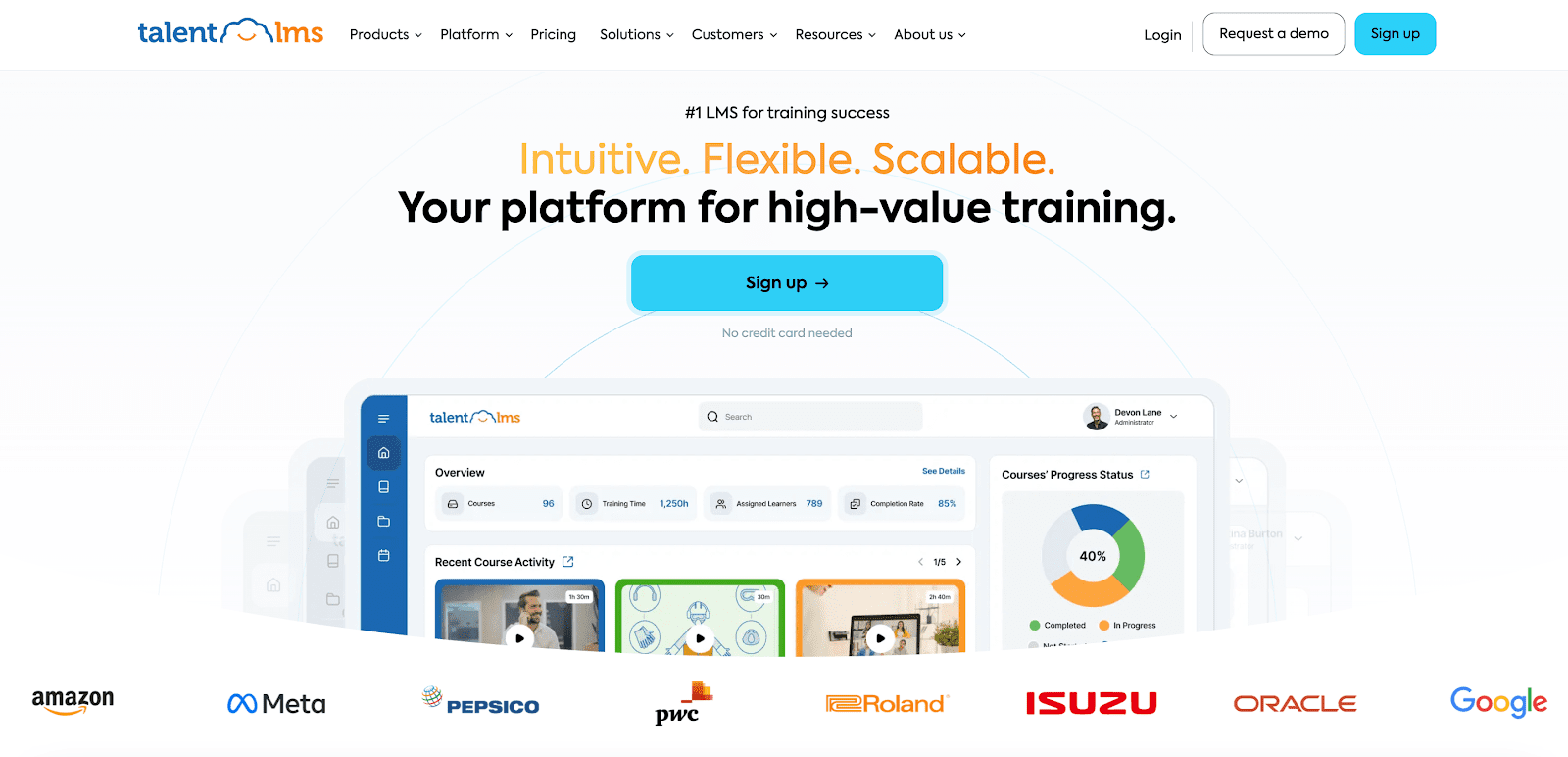
TalentLMS is a cloud-based learning management system designed to help organizations create, deliver, and manage online training programs efficiently. It allows teams to structure courses, track learner progress, and automate assessments, ensuring that employees, partners, or customers receive consistent and organized training.
The platform supports a wide range of content formats, including videos, presentations, documents, and quizzes, helping trainers to design diverse learning experiences.
Top features
- Course creation and management: TalentLMS offers a user-friendly course builder that supports various content types, including SCORM, xAPI, and cmi5.
- Customization: Personalize the platform with custom domains, themes, logos, and advanced options like CSS or JavaScript.
- Blended learning support: TalentLMS offers both instructor-led and self-paced learning, allowing organizations to deliver a mix of training formats to suit diverse learning preferences.
- Custom branding and white labeling: Organizations can customize the look and feel of their TalentLMS portal to align with their brand identity.
- User management and roles: The system supports multiple user roles and permissions, helping businesses to manage access and roles effectively.
- Clone units: TalentLMS allows administrators and instructors to duplicate existing course units or modules quickly, including all content, quizzes, and settings.
Advantages of TalentLMS
- User-friendly and fast setup: Talent LMS gives you a comprehensive interface, helping you quickly launch your training programs with little to no technical expertise.
- Scalable and flexible structure: The system supports branching and sub-accounts (called branches) to manage multi-department or multi-region training setups.
- Reporting and role management: The platform offers advanced reporting, role-based access control, and customizable user profiles for effective administration.
- Mobile and multilingual support: TalentLMS is accessible through native mobile apps and supports multiple languages, catering to global, on-the-go learners.
Limitations to consider
- Advanced feature limitations: May lack some advanced functionalities required by larger enterprises.
- Restricted theme customization: Customizing themes is limited compared to other platforms.
Pricing plans
TalentLMS offers a variety of pricing options depending on your user base:
- Free plan: Includes up to 5 users.
- Core plan: $149/month or $119/month (when billed annually) for up to 40 users.
- Grow plan: $299/month or $229/month (when billed annually) for up to 70 users.
- Pro plan: $579/month for up to 100 users or $449/month (when billed annually)
- Enterprise plan: Custom pricing for more than 1,000 users.

Integrations
- HRIS integration: TalentLMS supports integration with Human Resource Information Systems (HRIS) such as BambooHR, SagePeople, and ADP. This allows for automated user management, including the addition of new hires and the deactivation of departing employees.
- Single Sign-On (SSO): The platform enables Single Sign-On (SSO) integration with various identity providers, allowing users to access TalentLMS using their existing credentials.
Security and compliance
- ISO/IEC 27001:2013: TalentLMS follows the ISO/IEC 27001:2013 standard, which sets requirements for managing information security and safeguarding data.
- GDPR compliance: TalentLMS processes personal data in line with the General Data Protection Regulation (GDPR). It has completed a GDPR compliance program and participates in the EU Cloud Code of Conduct for cloud service providers.
Final verdict: TalentLMS supports diverse training needs with course creation, multilingual options, and reporting features, making it practical for many organizations. However, some advanced customizations may require external integrations or technical work, which can add complexity.
5. LearnDash
User rating: 4.2/5
Best for: LearnDash is ideal for teams and educators who already use WordPress and want to create and manage courses within that ecosystem.
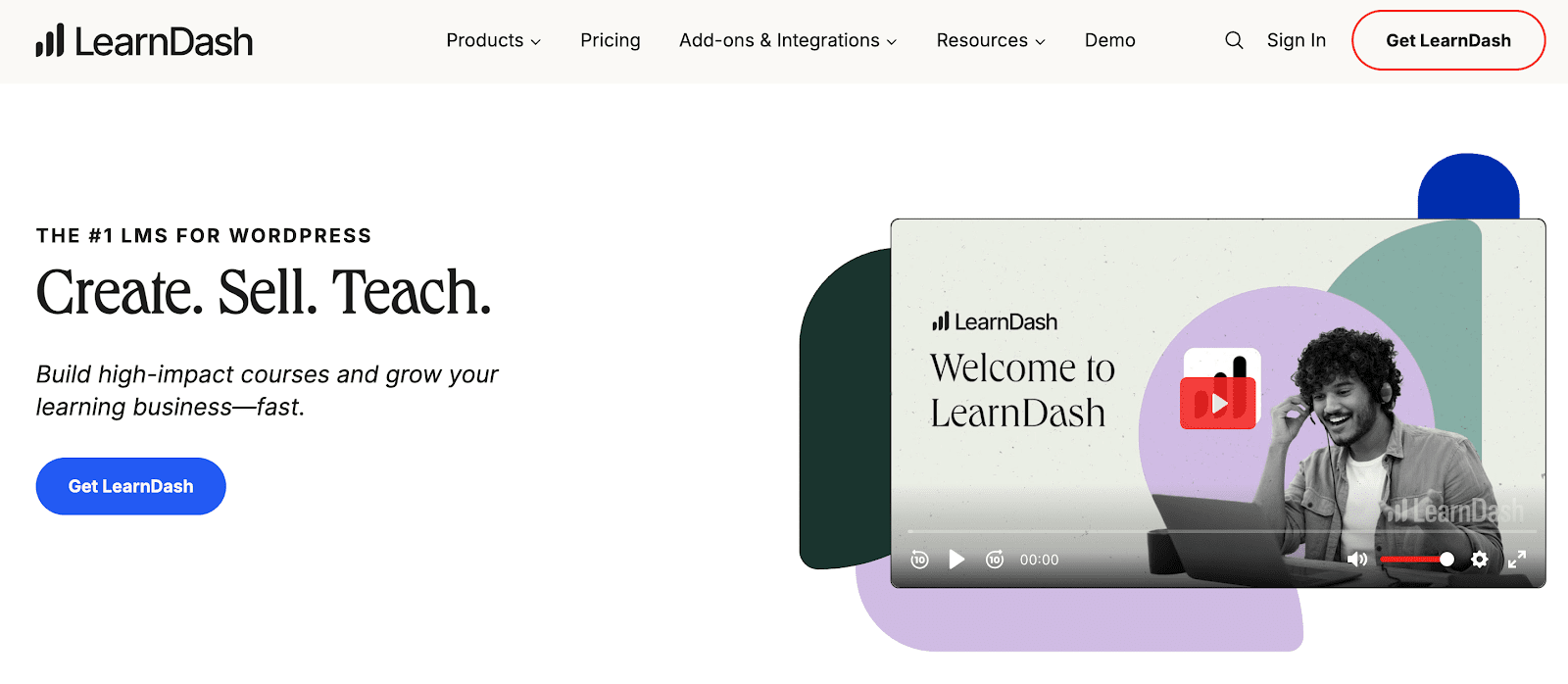
LearnDash works as a WordPress plugin that allows organizations to create, structure, and manage online courses within their existing websites. It includes learning tools such as lessons, quizzes, and assignments, along with progress tracking to monitor how learners move through a course.
Administrators manage everything from the WordPress dashboard, which can make the system easier to adopt for teams already using the platform.
The plugin integrates with a wide range of WordPress extensions, which means teams can connect it with payment gateways, analytics tools, or community features as needed. Because it is part of WordPress, the system adapts well to different types of training setups, though it also requires the same level of upkeep and technical management that comes with running a WordPress site.
Top features
- Visual course builder: LearnDash offers a drag-and-drop course builder that lets creators design course content, including lessons and quizzes, visually from the WordPress dashboard.
- Course cloning and wizards: You can duplicate entire courses with course cloning and quickly generate courses from video playlists using the course creation wizard.
- Focus mode and video progression: Focus Mode hides distractions during learning, and video progression ensures learners watch the full video before moving on.
- Automated notifications: You can automate email reminders and custom alerts triggered by specific learner actions, such as course completion.
- E-commerce and subscriptions: It integrates with payment tools like PayPal, Stripe, and WooCommerce, and supports selling courses as one-time purchases or recurring subscriptions.
Want to explore alternatives to LearnDash? Check out our article on the Top 6 LearnDash Alternatives.
Advantages of LearnDash
- Customization: Its open-source design offers flexibility, allowing businesses to tailor the platform to their unique needs.
- Scalability: Supports unlimited users and courses, making it suitable for businesses of any size.
- Active support and community: A strong user community and responsive customer support provide consistent assistance.
- No transaction fees: Businesses keep 100% of their course revenue, as LearnDash does not deduct transaction fees.
Limitations to consider
- WordPress dependency: Users must be familiar with WordPress, which could present a learning curve for beginners.
- Additional add-ons: Enhanced functionality often requires third-party plugins, adding complexity and potential costs.
- Limited marketing tools: Built-in options for promoting courses are minimal, necessitating external marketing platforms.
- Initial setup complexity: Beginners might find the setup process challenging, with available training resources not always meeting expectations.
Pricing plans
LearnDash LMS:
- $199 per year for a single-site license.
- $399 per year for 10 sites
- $799 per year for unlimited sites.

StellarSites Learning:
- Essentials: $39/month or $29/month (when billed annually).
- Plus: $69/month or $55/month (when billed annually).
- Ultimate: $99/month or $79/month (when billed annually).
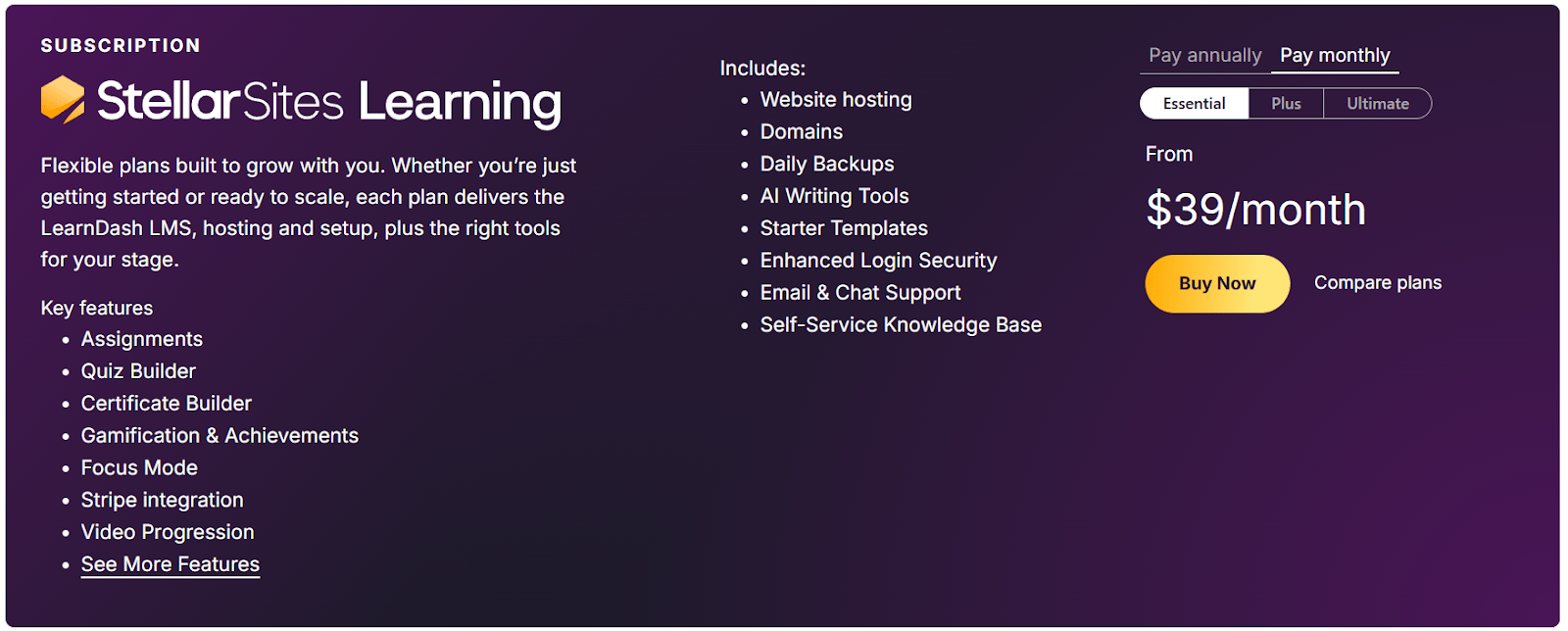
LearnDash also offers a set of add-ons, which come at a price. You can explore the full LearnDash pricing and additional features here. Groups management
- Gradebook
- Propanel 3.0
- Ratings, Reviews, and Feedback.
Integrations
Plug and tools ecosystem: LearnDash supports integrations through WordPress plugins, such as WooCommerce for e-commerce functionality, Elementor for visual design flexibility, WP Fusion for CRM synchronization, and BuddyBoss/BuddyPress for social/community features. These tools help connect LearnDash to broader workflows and content experiences.
Security and compliance
- The Integrity add-on helps prevent content theft by enabling protection against hotlinking, enforcing one-session-per-user policies, disabling right-click or copy functions, and adding reCAPTCHA verification to login and registration forms.
- The LearnDash Cloud offering includes pre-installed security tools, such as firewalls, daily automatic backups, SSL certification, and performance-boosting caching, which improve site security and reliability.
Final verdict: LearnDash operates within WordPress, giving businesses control over course structure and delivery in a familiar environment. The trade-off is that managing updates, plugins, and hosting can demand extra technical oversight compared to standalone LMS platforms.
6. 360Learning
User Rating: 4.6/5
Best for: 360Learning works well for organizations that want to combine top-down training with peer-driven learning. It suits companies that emphasize collaboration, as employees can contribute to course creation, feedback, and knowledge sharing alongside formal training.
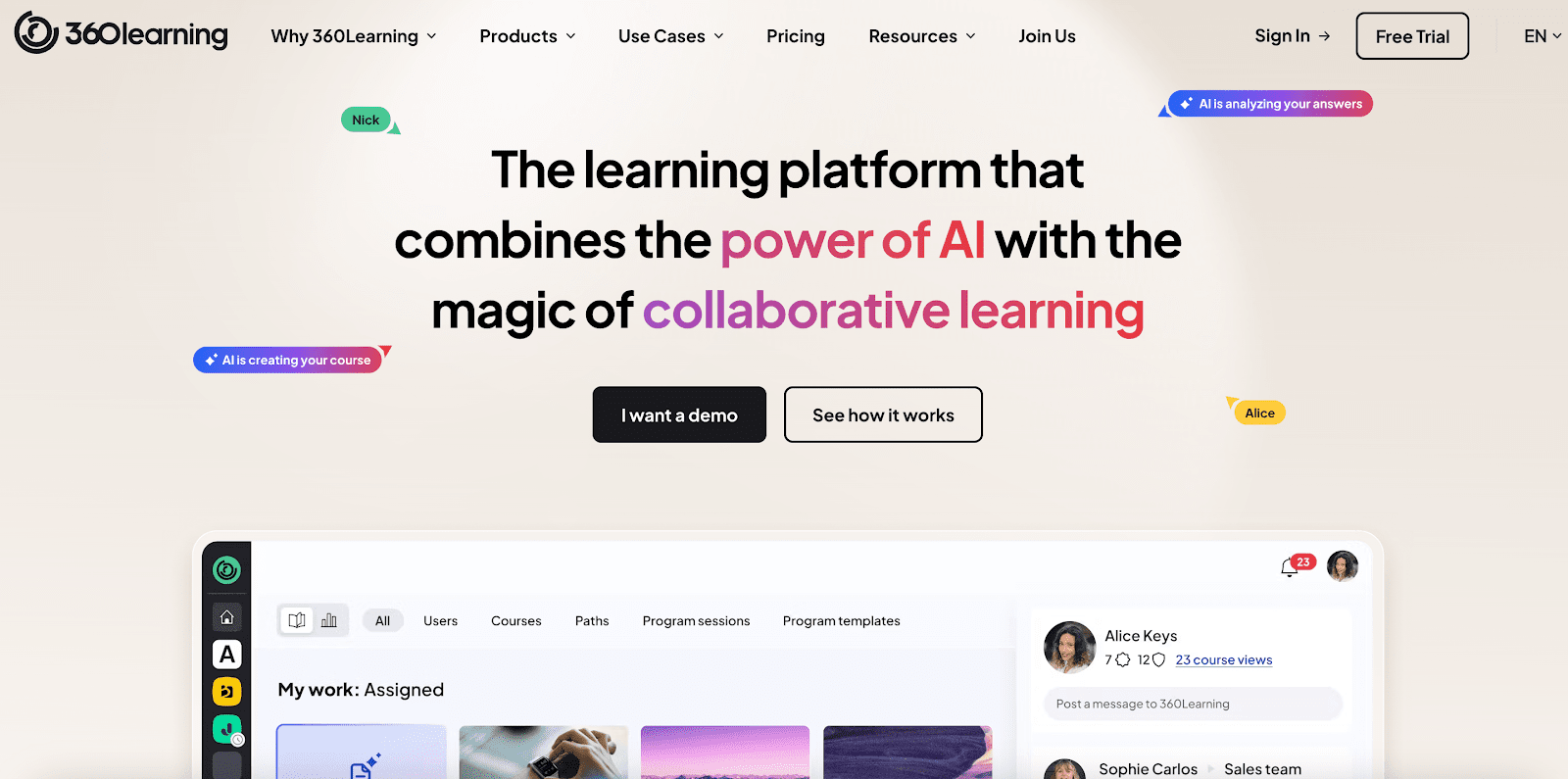
360Learning approaches corporate training by combining traditional course delivery with collaborative learning. It allows employees to contribute to course content, share feedback, and participate in peer discussions, making knowledge flow across teams rather than only from top-down instruction.
The platform also supports features like gamification, performance tracking, mobile access, and reporting, which help organizations manage training across different departments.
Businesses often use it for onboarding, compliance programs, and skill development, particularly when they want to capture expertise from within their workforce. At the same time, organizations need to plan carefully for adoption, as collaborative models can demand active participation from employees to be effective.
Top features
- Collaborative course creation: Teams can co-author courses using a drag-and-drop builder, with support for videos, SCORM, quizzes, and documents, all within a shared workspace for peer-driven content development.
- AI-powered authoring and recommendations: The platform uses AI to generate course outlines, questions, and content suggestions. It also delivers personalized course recommendations based on learner progress and performance.
- On-the-go learning: 360Learning is fully mobile-responsive, providing employees with the flexibility to access training materials and participate in learning activities anytime, anywhere.
- Collaborative and social learning tools: 360Learning supports discussion forums, peer feedback, real-time messaging, and course commenting, enhancing social learning and peer engagement.
Advantages of 360 Learning
- Smooth learning experience: 360Learning's user-friendly interface and engaging gamification elements make training enjoyable and motivating for employees.
- Encourage a culture of knowledge sharing: The platform actively encourages collaboration and peer-to-peer learning within your organization.
- Tailored to your needs: 360Learning is highly customizable, allowing you to align training with your unique business goals and brand identity.
- Dedicated support: 360Learning provides prompt and effective customer support to ensure a smooth and successful training experience.
Limitations to consider
- Cost considerations: 360Learning provides flexible pricing options, but the platform might represent a considerable expense for certain small businesses.
- Administrative learning curve: Administrators may require a period of adjustment to fully utilize all the platform’s functionalities, despite its intuitive learner navigation.
Pricing plans
360 Learning offers two pricing structures:
- Team: $8/registered user per month
- Business: Custom pricing.
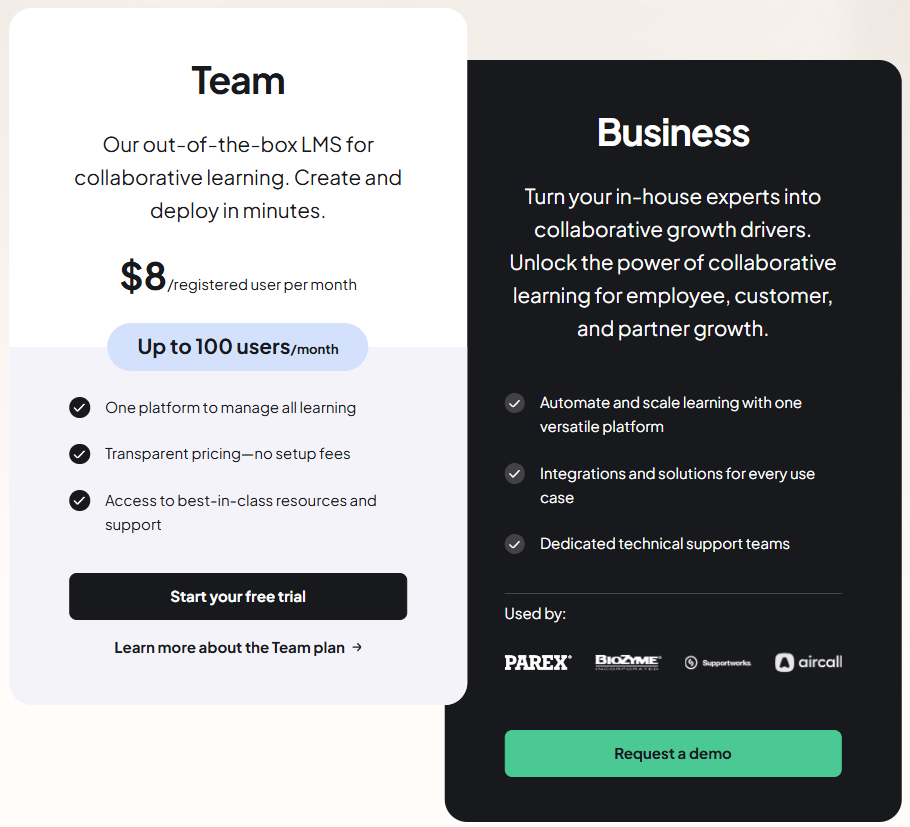
Integrations
- HRIS connector: Administrators can import and sync user data from HRIS systems using CSV-based connectors that map fields like email, organization, manager, and custom attributes. 360Learning also offers deeper integrations, such as with SAP SuccessFactors, helping companies to have smooth synchronization of learning data and single sign-on experiences.
- Platform ecosystem and API: The platform integrates with tools such as Slack, Microsoft Teams, Salesforce, Google Drive, OneDrive, and SharePoint for notifications, content sharing, and automated workflows. It also provides APIs to support custom integrations across users, courses, and learning paths.
Security and compliance
- The LMS implements a structured GDPR compliance framework that covers data protection policies, roles like a Data Protection Officer (DPO), record-keeping for data processing, breach response protocols, and user rights management.
- 360Learning hosts its platform on Microsoft Azure, leveraging Azure’s compliance standards (ISO 27001, SOC 2, SOC 3, etc.) and security features like data encryption (AES-256), forced HTTPS, IP access controls, EDR/XDR defenses, and biannual external security assessments.
Final verdict: 360Learning supports collaborative learning with solid integrations and GDPR-compliant security, making it practical for workplace training. Still, its customization and analytics options may feel limited for some organizations.
7. Litmos
User rating: 4.3/5
Best for: Litmos works best for organizations that need scalable corporate training across diverse teams and locations. The platform also emphasizes compliance-focused training, which makes it suitable for industries like healthcare, finance, and retail, where regulatory training is critical.
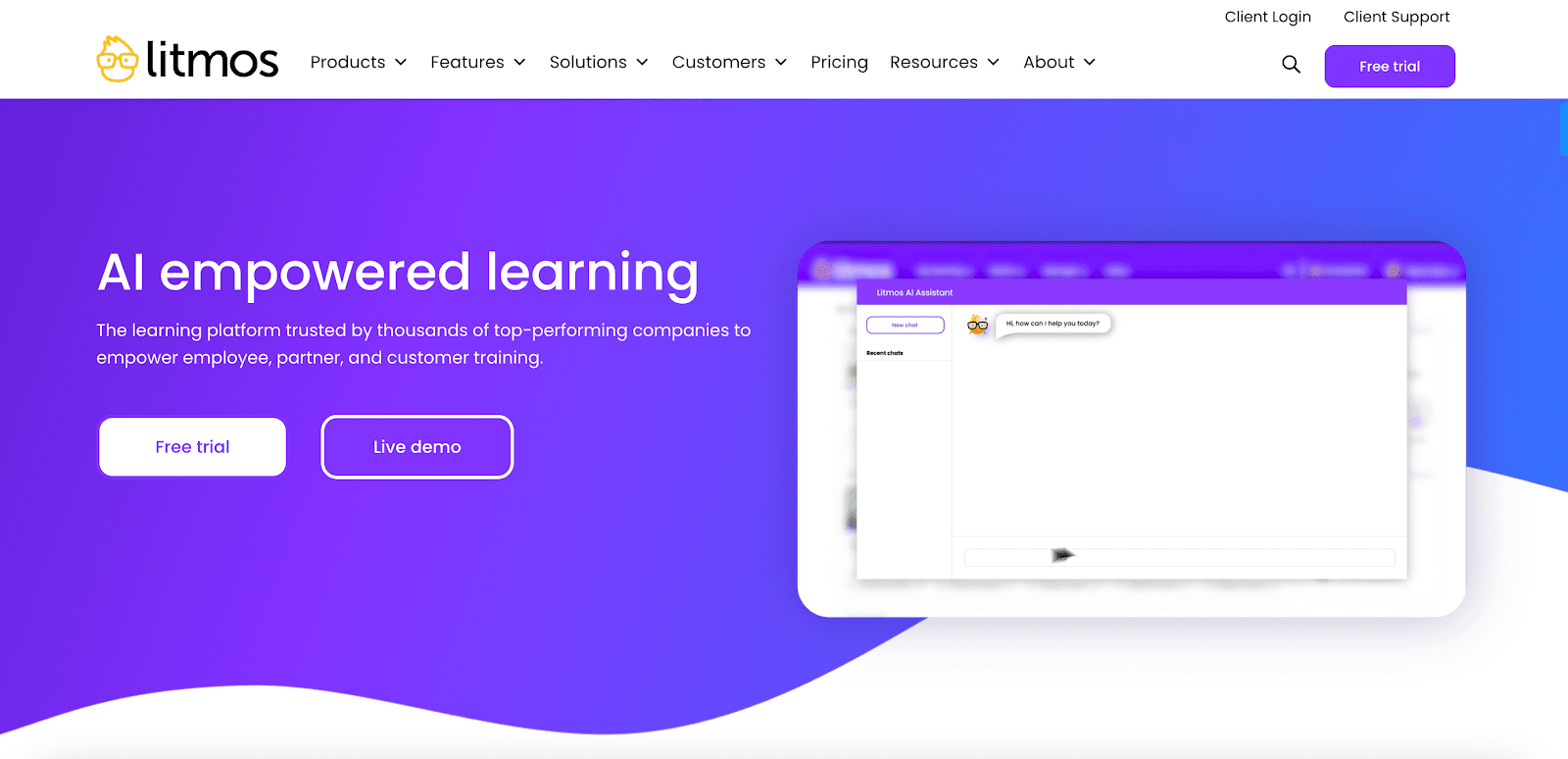
Litmos is a cloud-based learning management system that organizations use to deliver corporate training, compliance programs, and skill development. It focuses on providing a streamlined experience where teams can upload content, assign courses, and track progress through built-in reporting. Administrators can create training paths, use assessments, and monitor learner activity to evaluate performance and compliance readiness.
The platform supports multiple formats, including SCORM, xAPI, video, and documents, allowing flexible content deployment. Mobile accessibility plays an important role in Litmos, as learners can access training through the mobile app or web browser, making it practical for distributed and frontline teams.
Top features
- Mobile learning with offline access: Litmos offers a responsive mobile app for iOS and Android that keeps learning seamless across devices and supports offline content access and biometric SSO.
- Reporting and analytics: It provides real-time analytics via built-in dashboards, customizable reports, and data export options, without relying on IT support.
- Built-in course authoring and off-the-shelf content: Organizations can create mobile-responsive courses directly in the LMS or use ready-made course libraries for compliance and leadership training.
- Gamification elements: The platform includes badges, leaderboards, certificates, and interactive hotspots to enhance learner engagement.
Advantages of Litmos
- User-friendly: Both administrators and trainees can easily navigate and utilize the platform with minimal training.
- Data-driven insights: Comprehensive analytics provide valuable data on training effectiveness and return on investment for businesses.
- Budget-friendly: Flexible pricing options cater to various business sizes and budgets, making it accessible for even smaller organizations.
- Quick implementation: Quick and easy deployment minimizes the need for extensive IT involvement, allowing businesses to get training up and running rapidly.
- Customization options: Businesses can personalize the LMS with their branding, creating a consistent and professional learning experience.
Limitations to consider
- Limited advanced customization: Compared to some enterprise-level platforms, Litmos may offer fewer options for highly customized learning experiences.
- Additional costs for premium features: Accessing the content library and integrating with other tools may require purchasing additional features or subscriptions.
- Basic authoring tools: The built-in tools for creating courses might not be as sophisticated as specialized eLearning authoring software, potentially requiring the use of external tools.
Pricing plans
Litmos offers a custom pricing structure with options to suit different business needs and budgets.
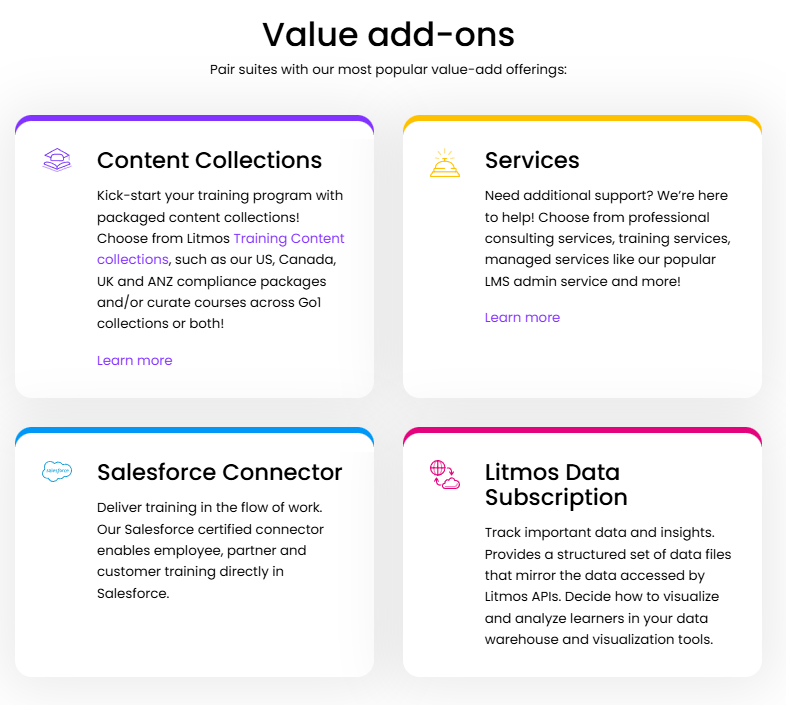
Integrations
Litmos integrates with business systems such as Salesforce, Zendesk, GoToMeeting, and Zoom. It also provides APIs and Single Sign-On (SSO) support, allowing organizations to connect the LMS with HR, CRM, and collaboration tools for smoother workflows.
Security and compliance
Litmos maintains certifications, including SOC 2 Type II and ISO/IEC 27001:2022, which establish requirements for information security and operational controls. The platform enforces data encryption, secure SSO, and regular audits to align with industry security practices.
Final verdict: Litmos provides a straightforward way to deliver and manage training at scale, with mobile access and built-in tools for compliance and tracking. However, its customization and reporting depth can feel restrictive for organizations that want highly tailored learning experiences.
8. Docebo
User rating: 4.3/5
Best for: Docebo works best for mid-sized to large organizations that need to manage diverse training needs, from employee development to customer and partner education. Through AI-powered features, this platform works for companies that want a single platform to deliver training across multiple audiences.
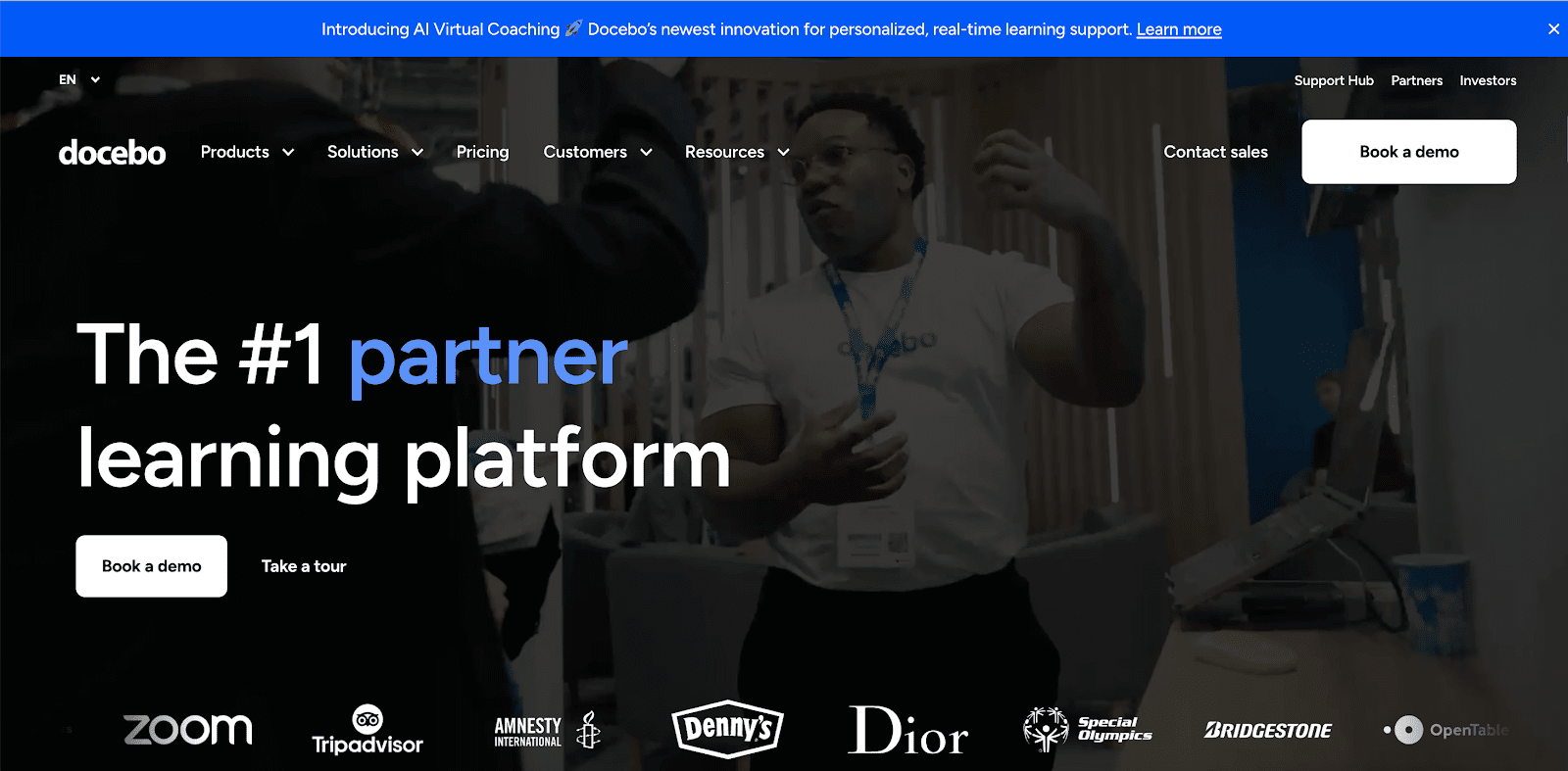
Docebo is a cloud-based LMS that enables organizations to deliver training for employees, customers, and partners in one platform. It supports AI-driven features like content recommendations and automation, which help streamline learning management.
The system integrates with HR and business tools to centralize data and reporting. While it offers flexibility for large-scale training, smaller organizations may find its setup and management more complex compared to lightweight LMS options.
Top features
- AI-powered learning: Docebo leverages artificial intelligence to create personalized learning experiences, recommend courses, and assess learner performance.
- Content marketplace: Organizations can access a large library of pre-made courses from providers like Go1 and OpenSesame to enhance or augment their training programs.
- Social and collaborative learning (coach and share): Docebo enables learners to share knowledge through forums, messaging, and peer-created content, reinforcing social learning within the platform.
- E-Commerce and certifications: The platform supports selling courses via built-in eCommerce capabilities and managing certifications with reminders and renewals.
- Multi-tenancy: Supports managing multiple audiences or clients within a single platform, which is beneficial for businesses with diverse user bases.
Advantages of Docebo
- User-friendly interface: Easy to navigate, even for those without technical expertise.
- Scalability: Adapts to growing training demands as the business expands.
- AI Features: Enhances engagement through personalized recommendations and adaptive learning pathways.
- Extensive integration options: Simplifies workflows by connecting with popular software tools.
- Supportive community: Offers access to a robust support network and detailed documentation.
Limitations to consider
- Cost: The per-user subscription model might be expensive for very small businesses or startups.
- Advanced features learning curve: Mastering some advanced functionalities may require additional training.
- Limited offline access: The mobile app provides convenience but offers minimal offline learning options.
Pricing plans
Docebo provides two primary pricing tiers: Elevate and Enterprise. Specific pricing details are available upon request through their sales team.
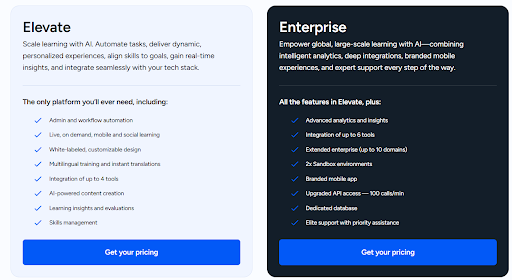
Integrations
Docebo connects with Salesforce, Microsoft Teams, Zoom, Shopify, Slack, and Workday, among others, to manage learning across HR, CRM, and collaboration workflows. The platform also provides an open API for custom connections when prebuilt integrations are not sufficient.
Security and compliance
- It holds ISO/IEC 27001, 27017, 27018, and 27701 certifications and undergoes SOC 2 audits, demonstrating structured information security management.
- The platform complies with GDPR, enabling organizations to meet EU data protection requirements.
Final verdict: Docebo offers flexibility through its broad integrations and strong compliance framework, which makes it adaptable across industries with strict data security needs. However, its non-transparent pricing model and feature complexity can pose challenges for smaller organizations with limited budgets or technical resources.
9. Cornerstone OnDemand
User rating: 4.3/5
Best for: Cornerstone OnDemand is for mid-sized to large organizations needing a scalable, enterprise-grade LMS with centralized learning, compliance tracking, and analytics.
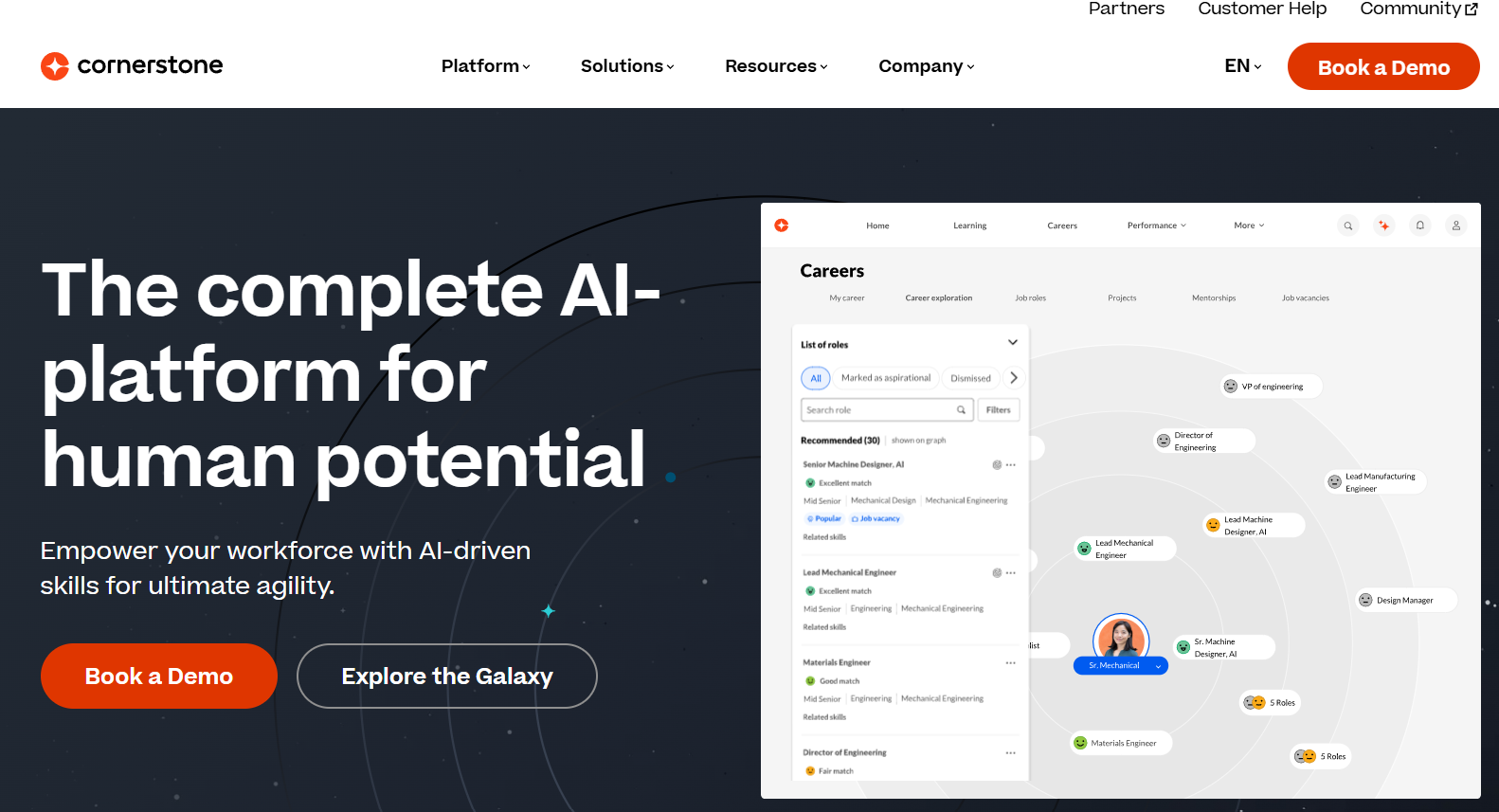
Cornerstone OnDemand provides a centralized space where organizations can design, deliver, and track learning programs for employees, partners, and customers. Administrators can create structured learning paths, assign courses based on roles or departments, and set prerequisites to ensure learners progress in a logical sequence.
The platform enables detailed reporting on course completion, learner engagement, and skill development, helping organizations monitor training effectiveness. It also supports various content formats, including videos, documents, and quizzes, allowing instructors to build diverse and interactive learning experiences.
Top features
- Course management and learning paths: Admins can create structured courses, learning plans, and curricula for different roles or departments.
- Reporting and analytics: Dashboards and reports provide insights on learner progress, course completion, and skill gaps.
- Content library and marketplace: Pre-built courses and templates are available for compliance, leadership, and soft skills training.
- Extended enterprise: Admins can manage learning for partners, vendors, and external audiences with separate portals.
- Social and collaborative learning: Social badges, peer feedback, and collaborative activities support knowledge sharing.
Advantages of Cornerstone OnDemand
- Suits large organizations with multiple audiences: Cornerstone OnDemand allows organizations to manage employees, partners, and customers on a single platform, making it easier to handle multiple learner groups and training programs.
- Centralized learning management: The platform provides structured learning paths, role-based access, and detailed reporting, enabling administrators to monitor learner progress and training effectiveness.
- Supports diverse learning formats: Cornerstone OnDemand accommodates videos, documents, quizzes, and collaborative activities, allowing organizations to design interactive and engaging learning experiences.
Limitations to consider
- Complex configuration: Setup and configuration can be complex, requiring IT or implementation support for automatic user provisioning and other API integrations.
- Higher licensing cost: Cornerstone OnDemand's pricing will vary depending on the organization's needs and size. However, some users have reported that the platform's cost can be prohibitive for very small organizations.
Pricing plans
Cornerstone does not publicly disclose standard pricing. You should book a demo to know the platform’s pricing details.
Integrations
- HRIS and ERP: Connects with Workday, Salesforce, and other HR systems to centralize employee training data.
- SSO and identity management: Supports SAML, OAuth, and other SSO protocols to integrate with identity providers like Azure AD or Okta.
Security and compliance
- Holds certifications such as ISO/IEC 27001, SOC 2 Type II, and FedRAMP.
- Supports GDPR compliance, HIPAA, FDA 21 CFR Part 11, and other regulatory frameworks.
Final verdict: Cornerstone OnDemand provides an enterprise-grade LMS suitable for large organizations needing centralized learning, compliance tracking, and analytics. Its integrations and security certifications make it reliable for regulated industries. However, smaller companies may find it costly and complex to implement.
10. Absorb LMS
User rating: 4.6/5
Best for: Absorb LMS suits enterprises that need a cloud-based, scalable learning management system. Organizations that want detailed reporting, automated workflows, compliance, and a modern learner experience find it particularly effective.
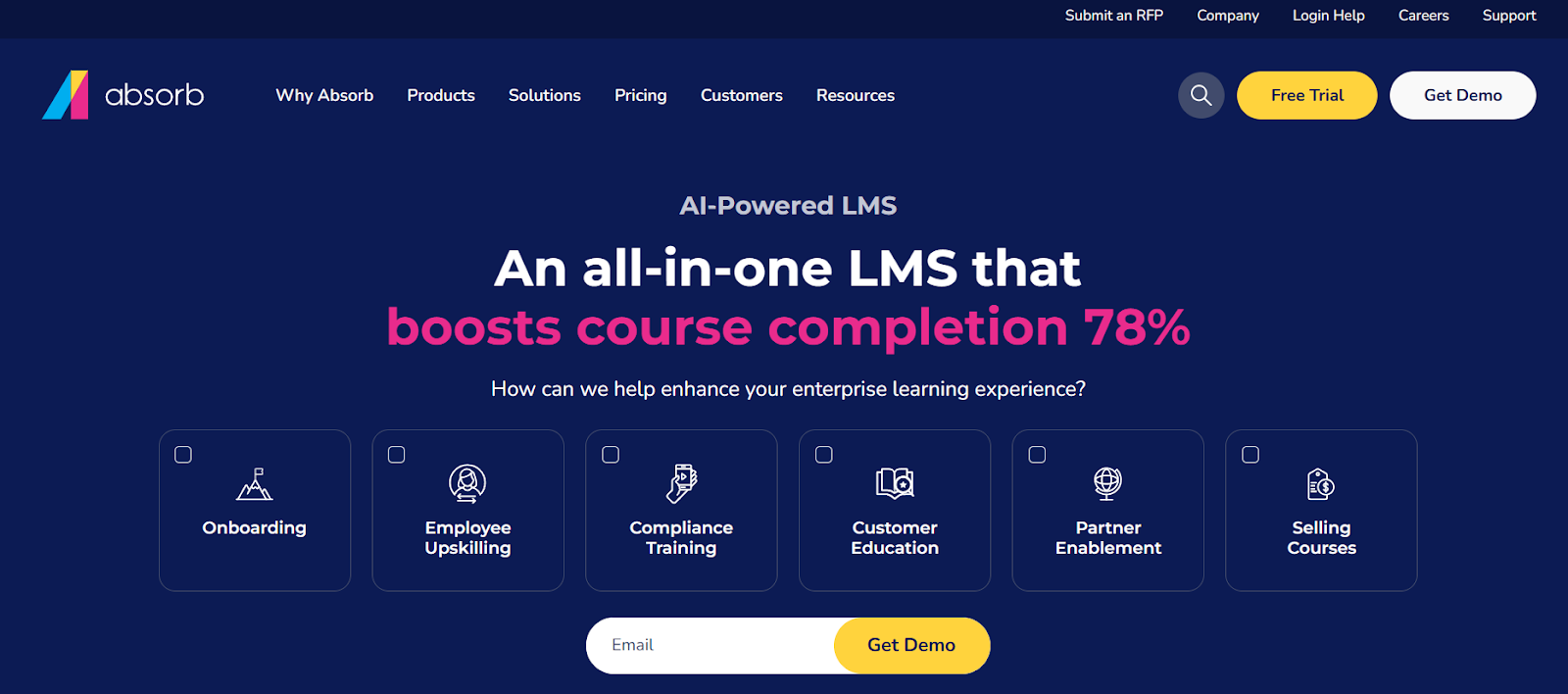
Absorb LMS is a cloud-based platform designed to organize, deliver, and track training programs for businesses and organizations. It allows administrators to create structured courses, assign learning paths, and monitor learner progress through detailed reporting tools.
Absorb LMS includes features such as automated enrollment, customizable dashboards, and competency tracking to help organizations maintain compliance and assess skill development. By centralizing training management, Absorb LMS helps organizations standardize learning, measure outcomes, and optimize performance without requiring extensive technical support.
Top features
- Course authoring and delivery: Absorb LMS provides tools for creating and delivering courses, including assessments, quizzes, and instructor-led training.
- Communication and notifications: The platform includes features for sending notifications and communications to users, improving engagement.
- Absorb Infuse: Absorb Infuse allows embedding of learning modules, such as course catalogs, progress tracking, and collaboration tools into existing business applications, providing a unified user experience.
Advantages of AbsorbLMS
- Comprehensive reporting and analytics: The platform offers advanced reporting tools that enable administrators to track learner progress, assess course effectiveness, and make informed, data-driven decisions to enhance training programs. This feature supports the measurement of learning outcomes and ROI.
- Personalized learning paths: Absorb LMS supports the creation of customized learning paths tailored to individual learner needs, roles, and goals. This personalization enhances engagement and ensures that training is relevant and aligned with career development objectives.
- Mobile accessibility: The platform's mobile app allows learners to access training materials anytime and anywhere, facilitating learning on the go. This flexibility is particularly beneficial for remote or field-based employees.
Limitations to consider
- Limited customization options: Users have expressed a need for more design choices and easier management features within the platform. Some have found the learner portal's design options to be restrictive, particularly in industries with high turnover rates where frequent updates are necessary.
- Insufficient reporting capabilities: Users find Absorb LMS's reporting features inflexible. The system does not provide detailed insights, which complicates mobile assessments and limits tracking of specific learner progress.
Pricing plans
Absorb LMS pricing varies based on the number of learners, and the company does not publicly disclose pricing information.
Integrations
System integration: Absorb LMS connects with HRIS, CRM platforms, and identity management tools.
Single Sign-On (SSO): Supports SAML 2.0 and OpenID Connect/OAuth for secure and efficient user authentication.
API access: Provides a RESTful API to build custom integrations and automate data exchanges.
Security and compliance
- The platform is WCAG 2.0 compliant, ensuring accessibility for all learners and administrators.
- Absorb LMS completed the SOC 2 Type 2 examination, improving data security compared to competitors without this certification.
- The system complies with FDA 21 CFR Part 11 regulations, supporting secure and legally valid electronic signatures.
Final verdict: Absorb LMS delivers structured, mobile-friendly training with personalized learning paths and workflow-integrated courses. However, users find its customization and reporting options limited.
11. LearnUpon
User rating: 4.6/5
Best for: LearnUpon is well-suited for organizations seeking a platform that supports both internal employee training and external customer education. Its features cater to businesses aiming to streamline product training processes and improve learner engagement.
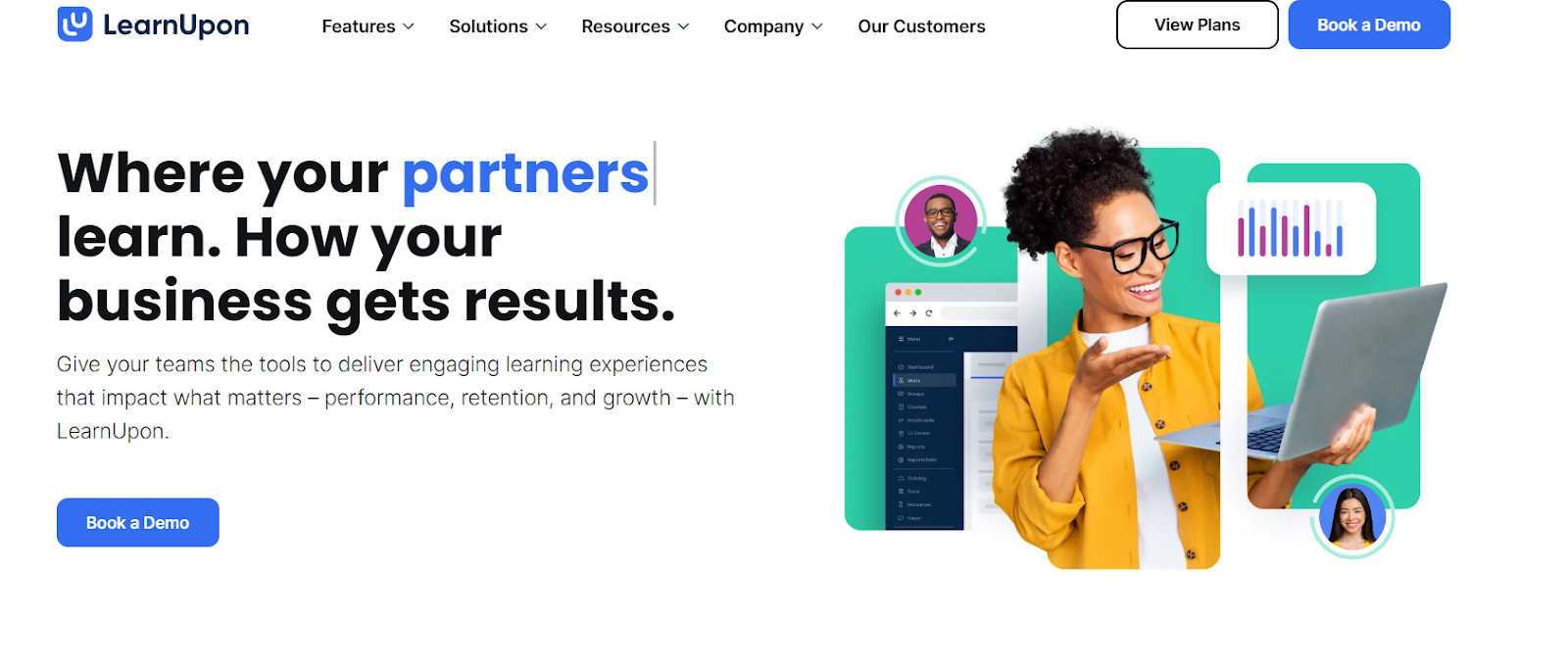
LearnUpon is a cloud-based LMS designed to help organizations create, deliver, and track training programs for multiple audiences, including employees, customers, and partners. It supports multiple content formats such as SCORM, xAPI, video, and documents, allowing organizations to design versatile and interactive courses.
LearnUpon facilitates automated enrollment, notifications, and certifications, reducing administrative workload and ensuring learners receive timely updates. Its mobile app allows learners to access training on the go, while its multi-tenant architecture enables organizations to manage separate portals for different audiences or brands within a single account.
By centralizing training management, LearnUpon helps organizations standardize learning, measure outcomes, and optimize performance without requiring extensive technical resources or complex setup.
Top features
- Course creation and delivery: LearnUpon provides tools for creating and delivering courses, including assessments, quizzes, and instructor-led training sessions.
- Automation: The platform features include tools for automating enrollment, notifications, and certifications, thereby reducing manual administrative tasks.
- Multi-tenant architecture: The system supports managing separate portals or brands within one account, facilitating training for different audiences.
- Extensive course template library: LearnUpon offers pre-designed templates that streamline course creation, provide a structured framework for training programs, and allow customization for unique learning paths, reducing content development workload for HR and L&D teams.
- Reporting and analytics: LearnUpon provides advanced reporting tools that enable administrators to track learner progress, assess course effectiveness, and make informed decisions to enhance training programs.
Advantages of LearnUpon
- Versatile content support: The platform supports various content types, including SCORM, xAPI, video, and documents, allowing for diverse course creation.
- Easy onboarding for new users: LearnUpon simplifies the onboarding process for both administrators and learners with its intuitive interface and guided workflows, reducing the time required to get started.
- Supports blended learning: The LMS accommodates multiple delivery methods, including instructor-led sessions, virtual classrooms, and self-paced courses, giving organizations flexibility to design comprehensive learning programs.
Limitations to consider
- Navigation and filtering challenges: Some administrators have found the platform's navigation to be unintuitive, particularly when filtering and sorting courses or users. These usability issues can complicate the management of large-scale training programs.
- Pricing considerations: Some users have expressed concerns that LearnUpon's pricing does not provide the expected ROI.
- Integration limitations: Users have also experienced difficulties integrating LearnUpon with certain Microsoft products and other enterprise systems. These integration challenges can affect seamless data flow and user management across platforms.
Pricing plans
LearnUpon offers a subscription-based pricing model based on the number of monthly active users (MAUs). The platform does not publicly disclose specific pricing details; you should contact LearnUpon directly to get a tailored quote based on your organization's needs.
Integrations
LearnUpon supports integrations with various third-party applications to enhance its functionality. These integrations include tools for customer relationship management (CRM), human resource information systems (HRIS), and other enterprise applications.
Additionally, LearnUpon provides a REST-based API, allowing organizations to build custom integrations and automate data exchanges between LearnUpon and other systems.
Security and compliance
The platform is ISO 27001:2022 and ISO 27701:2019 certified, SOC 2 compliant, and GDPR compliant. It also ensures a 99.99%+ uptime and is powered by Amazon Web Services (AWS), providing a secure and reliable environment for users.
Final verdict: LearnUpon offers a user-friendly interface, versatile content support, and robust automation features. Its mobile accessibility and multi-tenant architecture make it suitable for organizations with diverse training needs. However, limitations in customization, basic reporting tools, and scalability concerns may impact organizations with complex requirements.
12. Tovuti
User rating: 4.6/5
Best for: Tovuti works well for small to medium enterprises that need an intuitive and cost-effective solution for employee training. It also delivers interactive and engaging learning experiences for schools and universities.
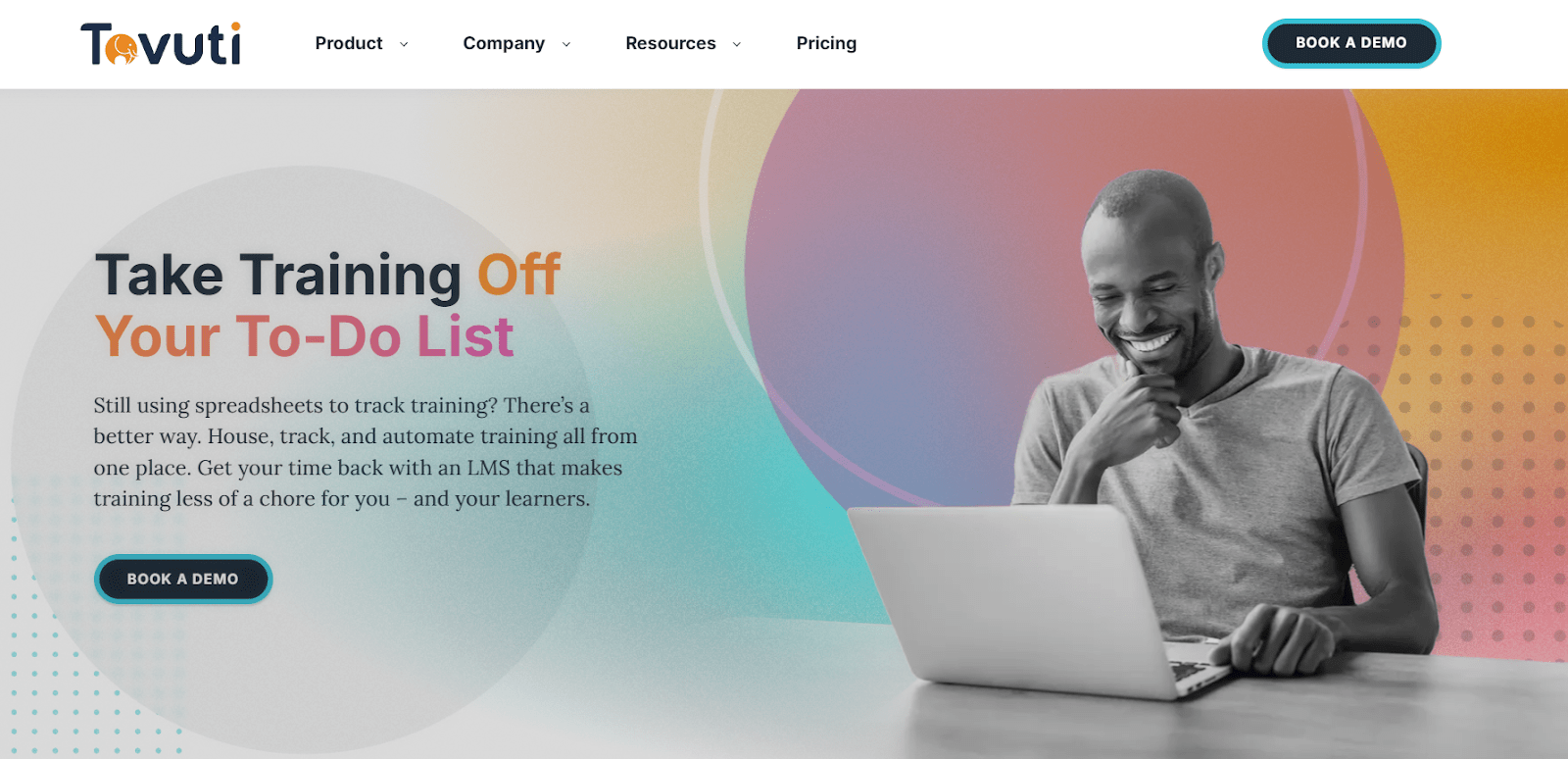
Tovuti LMS supports organizations to design, deliver, and track training programs efficiently. It combines course creation, learner engagement, and administrative management within a single platform, allowing organizations to centralize learning initiatives.
The LMS supports interactive content, gamification, and social learning features to enhance learner motivation and knowledge retention. Tovuti also provides reporting and analytics tools, helping administrators measure training effectiveness and optimize programs.
With mobile accessibility, e-commerce capabilities, and flexible customization options, Tovuti caters to diverse industries, including corporate training, education, and nonprofit organizations, scaling from small teams to enterprise-wide training.
Top features
- Course delivery: Tovuti provides built-in tools to create over 40 types of interactive content without the need for third-party software.
- Gamification: The platform includes features like badges, leaderboards, and points to enhance learner engagement.
- Mobile accessibility: Tovuti offers a customizable mobile app available on both iOS and Android, ensuring learners can access content on the go.
- Subscription management: Enables the sale and management of subscriptions to educational materials, including features like discounting, pausing, renewing subscriptions, and handling failed payments.
- Real-time analytics: Administrators can track learner progress and course effectiveness through comprehensive reporting tools.
Advantages of Tovuti
- User-friendly interface: Intuitive design makes it accessible for both administrators and learners.
- Comprehensive support: Extensive resources, including a support library and responsive customer service, are available.
- Tovuti marketplace: Administrators can access and share pre-built modules within the Tovuti marketplace, saving time on content creation and improving functionality.
Limitations to consider
- Difficult navigation: Some users have reported that the platform can be complex to navigate, requiring a significant amount of time to become proficient.
- Non-compatible mobile functionalities: While Tovuti LMS is mobile-friendly, it scores slightly lower in mobile compatibility compared to some competitors, indicating potential limitations in the mobile user experience.
Pricing plans
Tovuti offers tiered pricing based on the number of users and required features. Specific pricing details are available upon request through their website.
Integrations
- System integration: Tovuti LMS connects with various platforms, including CRM systems like Salesforce and Zoho, HRIS platforms such as BambooHR and Workday, and communication tools via Zapier.
- Single Sign-On (SSO): Supports SAML and Okta protocols for secure and efficient user authentication.
Security and compliance
- SOC 2 type 2 compliance: Tovuti LMS is SOC 2 Type 2 certified to maintain high security and compliance.
- GDPR and CCPA compliance: Ensures compliance with European and California data protection regulations.
- Accessibility: Meets WCAG 2.1 Level A and AA standards, as well as Section 508 compliance, ensuring accessibility for all users.
Final verdict: Tovuti LMS delivers a wide range of features, from interactive course creation tools to strong integration options, making it suitable for organizations with diverse training needs. However, users have noted that reporting depth, occasional performance slowdowns, and administrative complexity can limit the overall experience.
13. Continu
User rating: 4.6/5
Best for: Continu LMS suits mid-to-large-sized organizations that need to centralize learning for internal teams, customers, and partners. It performs well in contexts requiring compliance, automation, and extended enterprise learning.
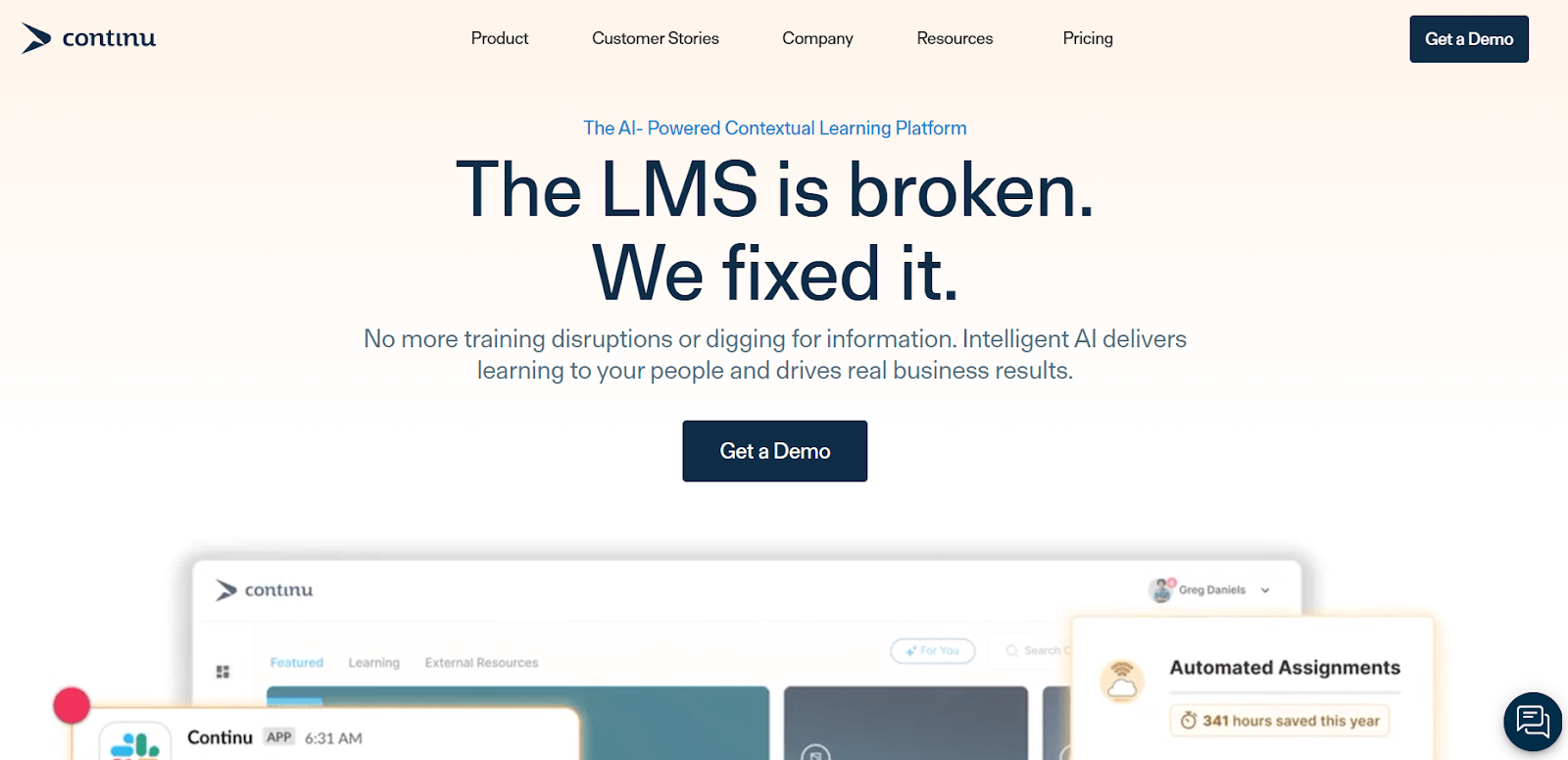
Continu LMS functions as a cloud-based learning management system that centralizes training for employees, customers, and partners within one platform. It supports organizations to create and deliver structured learning programs, track compliance, and measure learner progress with built-in analytics.
The platform incorporates features like automation, AI-driven content tagging, and integrations with communication and HR tools, which streamline both administrative tasks and the learner experience.
By supporting multiple content types and offering flexible delivery options, Continu enables organizations to standardize training across various teams and external stakeholders.
Top features
- AI-powered content tagging and captioning: Continu instantly generates tags and captions for videos to improve discoverability and accessibility.
- Automation engine for assignments: The system applies rules to automatically assign training based on triggers such as role changes, compliance updates, or onboarding dates.
- Open API and analytics integrations: The platform provides APIs and connects with Google Analytics for seamless data exchange.
Advantages of Continu
- Intuitive interface: Continu uses a clean and straightforward design that supports ease of use for both administrators and learners.
- Content management flexibility: Continu supports multiple formats, including video, SCORM, PDFs, and custom content, making it adaptable for diverse training requirements.
- Scalability for extended enterprise learning: Continu supports both internal employee training and external audiences, such as customers and partners, within a single system. This scalability allows organizations to manage multiple training use cases without needing separate platforms.
Limitations to consider
- Limited branding: The platform limits flexibility in adjusting the look and feel of learning pages, branding elements, and notification preferences, which reduces the ability to align training with organizational style and communication needs.
- Search query issues: The search function struggles with highly technical queries, and the system does not fully support embedding real-time data dashboards from external monitoring tools, which restricts advanced data use.
Pricing plans
Continu offers tier-based subscription plans: Growth, Professional, and Enterprise, with features expanding across tiers, including API access and external user profiles in higher levels. Pricing is available upon request.
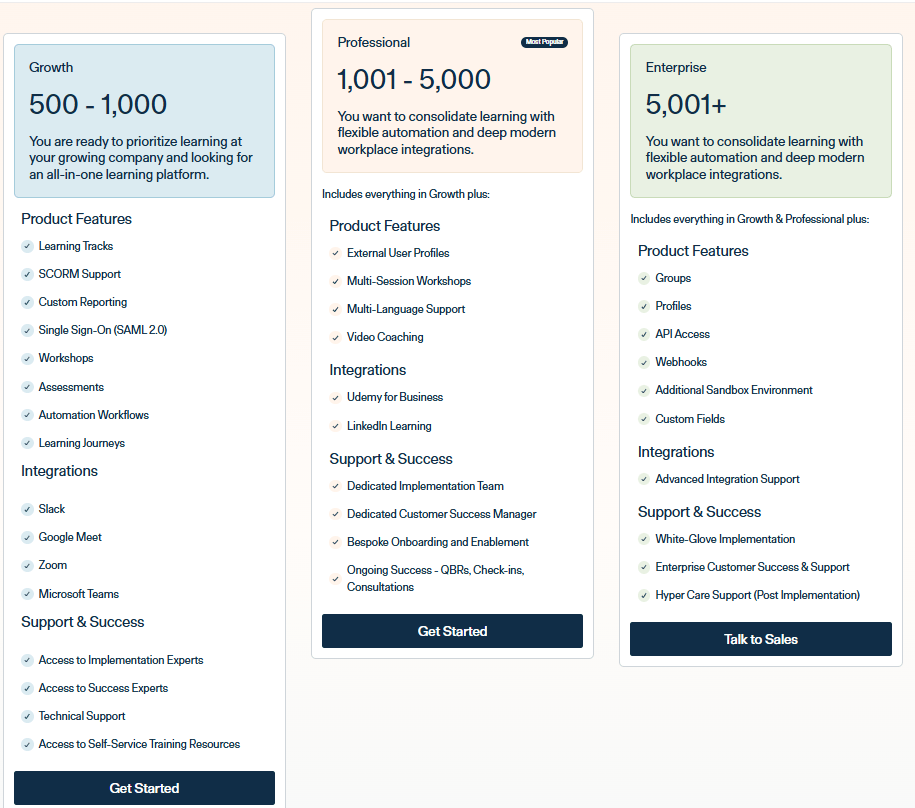
Integrations
- System integration: Continu connects with CRMs (e.g., Salesforce), HR systems (e.g., BambooHR), and content libraries like LinkedIn Learning and OpenSesame.
- Communication tools: It integrates with Slack, Zoom, Microsoft Teams, Google Meet, and Google Calendar to streamline training delivery.
- Open API and analytics: Continu provides open API access and integrates with Google Analytics for real-time tracking and automation.
Security and compliance
Continu holds SOC 2 compliance standards, ensuring data security and privacy.
Final verdict: Continu LMS streamlines training delivery through automation, AI-driven content management, and strong integration with workplace tools. Its intuitive design and scalability make it suitable for both internal teams and external audiences. However, the platform’s customization limits and gaps in search functions can restrict flexibility for some organizations.
Implementation and migration playbook
Rolling out an LMS successfully requires planning, cross-team collaboration, and phased execution. Here’s a step-by-step playbook with typical timelines:
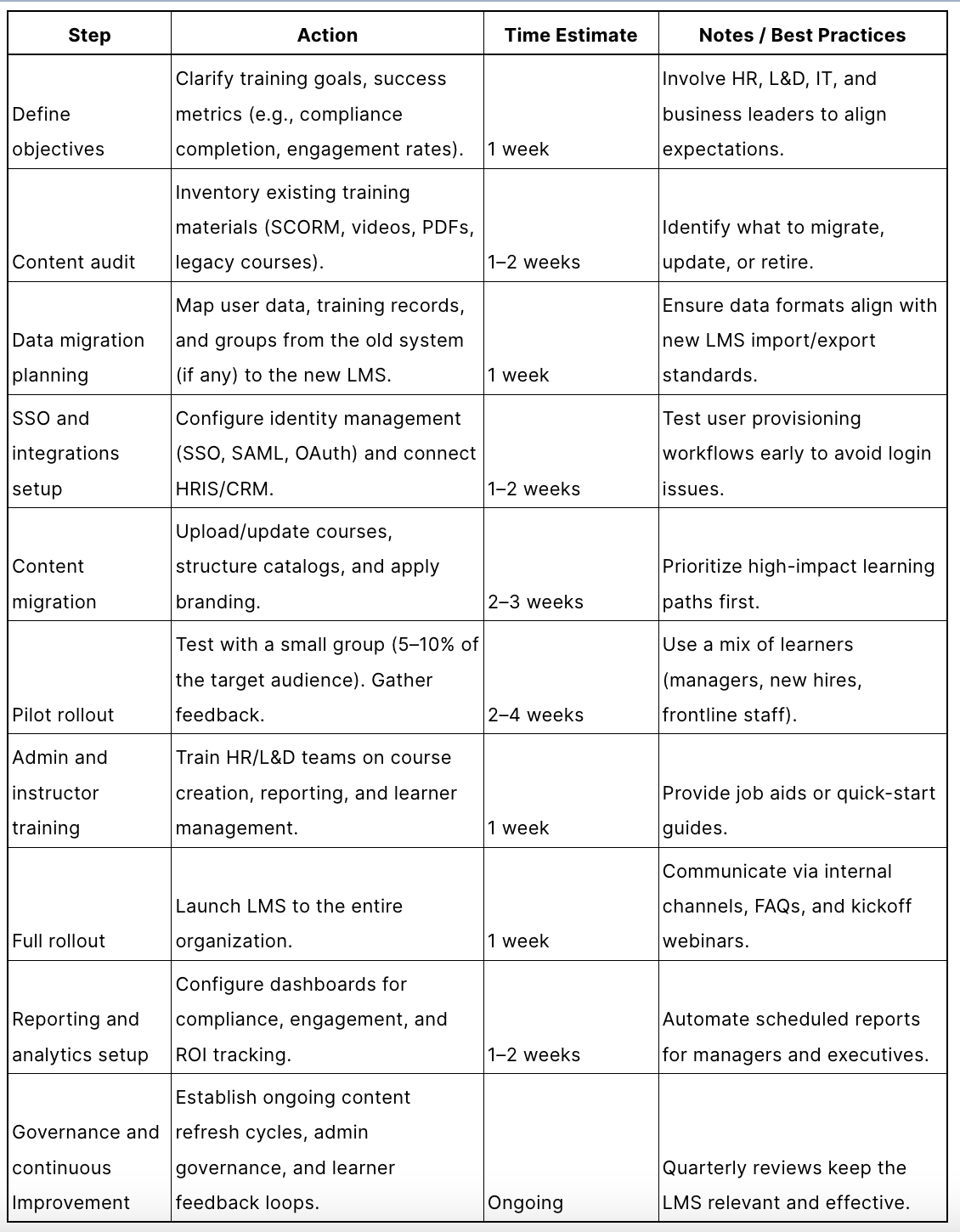
Wrapping up
When it comes to choosing an LMS, there’s no global solution — your selection will depend on your team size, business goals, and training needs.
- Cornerstone OnDemand, Docebo: Ideal for large enterprises needing robust compliance and global capabilities.
- TalentLMS, LearnDash, Tovuti: Works for SMBs seeking flexibility and ease of use.
- Absorb LMS: Designed for industries requiring collaborative learning.
- LearnUpon, Litmos: Best for product-focused training programs.
- Moodle, Google Classroom: Budget-friendly options that get the job done.
- 360Learning, Continu: built for collaborative, peer-driven learning environments.
For businesses that want to scale training, improve learner engagement, and accelerate business growth, FreshLearn stands apart. Its simple, intuitive platform makes creating, delivering, and managing courses effortless; so you can focus on results, not setup.
Find out how FreshLearn can transform your corporate training — try it today.
FAQs
1. How much does an LMS cost per user?
Most LMS platforms charge per user per month. Pricing usually starts around $2–$20 per user. Platforms like FreshLearn also offer simple, transparent pricing so you can scale without worrying about hidden costs.
2. What’s the difference between a cloud LMS and an on-premise LMS?
A cloud LMS runs online, updates automatically, and requires no server maintenance. An on-premise LMS requires installation, IT support, and higher upfront costs. Most modern businesses prefer cloud LMSs because they’re faster to implement and easier to maintain.
3. Can we migrate existing SCORM/xAPI files to a new LMS?
Yes, you can migrate SCORM and xAPI files to most modern LMSs. FreshLearn offers free migration support, so you can carry forward existing training content without rebuilding it.
4. Which LMSs support SSO and SCIM integrations?
Platforms like TalentLMS, Absorb, and Litmos support SSO (SAML/OAuth) and SCIM to make user logins and provisioning seamless.
5. Do LMS platforms support mobile learning apps?
Yes, most LMSs offer mobile access. FreshLearn is mobile-friendly by design, so learners can train on any device without extra downloads.
6. Can an LMS track compliance training for audits?
Yes, compliance-ready LMSs let you assign, track, and report on mandatory training. LMs also give you progress dashboards and completion certificates, making audits easier.
7. What security certifications should an LMS have?
Leading LMSs comply with GDPR, SOC 2, and ISO 27001. Some also meet HIPAA standards for healthcare.
8. How do I measure ROI on an LMS?
You can measure ROI by tracking training completion, engagement, productivity gains, and reduced training costs. Most Learning Management Systems provide analytics dashboards to show how learning impacts business performance.

